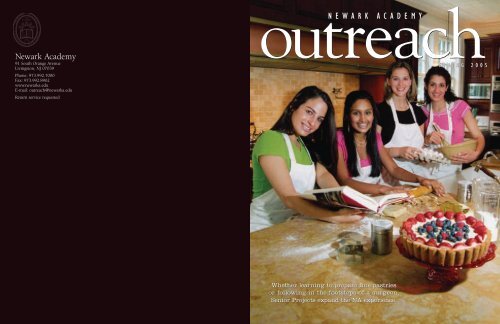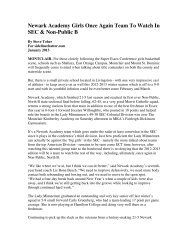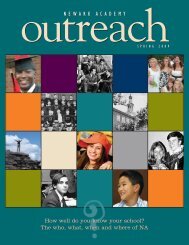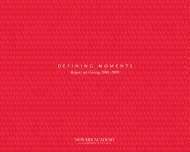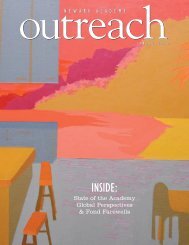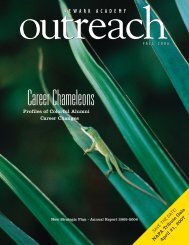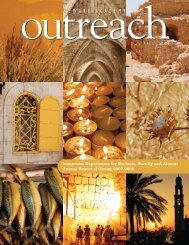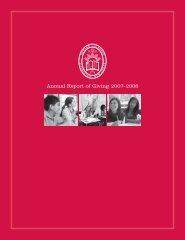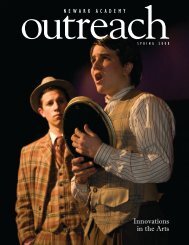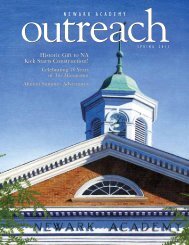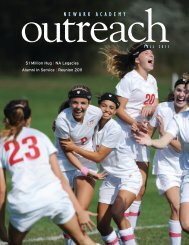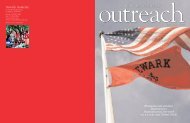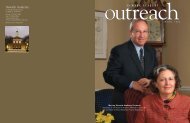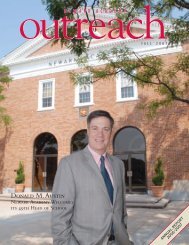Fascinated by an interview with the playwright ... - Newark Academy
Fascinated by an interview with the playwright ... - Newark Academy
Fascinated by an interview with the playwright ... - Newark Academy
Create successful ePaper yourself
Turn your PDF publications into a flip-book with our unique Google optimized e-Paper software.
<strong>Newark</strong> <strong>Academy</strong><br />
91 South Or<strong>an</strong>ge Avenue<br />
Livingston, NJ 07039<br />
Phone: 973.992.7000<br />
Fax: 973.992.8962<br />
www.newarka.edu<br />
E-mail: outreach@newarka.edu<br />
Return service requested<br />
outreach<br />
NEWARK ACADEMY<br />
Whe<strong>the</strong>r Whe<strong>the</strong>r learning learning to prepare fine pastries<br />
or or following following in <strong>the</strong> <strong>the</strong> footsteps footsteps of a surgeon, surgeon,<br />
Senior Senior Projects Projects exp<strong>an</strong>d exp<strong>an</strong>d <strong>the</strong> <strong>the</strong> NA NA experience.<br />
experience.<br />
SPRING 2005
SENIOR PROJECTS 2005<br />
Volunteer Work <strong>with</strong><br />
During <strong>the</strong>ir senior projects, Rebecca Groverm<strong>an</strong> ’05<br />
<strong>an</strong>d Julia Cross ’05 befriended Conrad <strong>an</strong>d Viper, dogs<br />
well on <strong>the</strong>ir way to becoming eyes for <strong>the</strong> blind. As<br />
a witness to <strong>the</strong> tr<strong>an</strong>sformation that takes place when<br />
a blind individual gains confidence <strong>an</strong>d independence<br />
through partnership <strong>with</strong> a dog, Rebecca describes it<br />
as “truly amazing experience.”<br />
in Morristown<br />
Contents<br />
24<br />
26<br />
28<br />
30<br />
Features<br />
16 Senior Projects<br />
A Creative Solution<br />
<strong>by</strong> Alex<strong>an</strong>dra Mahoney<br />
24 Cooking Class<br />
Emeril’s Got Nothing on Them!<br />
<strong>by</strong> Debra Marr<br />
26 The Arizona Trip<br />
Twenty-Two Years <strong>an</strong>d Going Strong!<br />
<strong>by</strong> Alex<strong>an</strong>dra Mahoney<br />
28 An Unforgettable Ride<br />
<strong>by</strong> Jon Olesky<br />
30 Rebuilding Lives<br />
Tsunami Relief Work in Sri L<strong>an</strong>ka<br />
<strong>by</strong> Tracy Robinton ’05<br />
Departments<br />
2 Perspectives<br />
4 Viewpoint<br />
7 NA News<br />
14 From <strong>the</strong> Archives<br />
34 Alumni Ga<strong>the</strong>rings<br />
35 Class Notes<br />
Check out <strong>the</strong> latest alumni news! www.newarka.edu<br />
4
outreach<br />
SPRING 2005<br />
Elizabeth Penney Riegelm<strong>an</strong><br />
Head of School<br />
Fred McGaugh<strong>an</strong><br />
Director of Institutional Adv<strong>an</strong>cement<br />
EDITOR<br />
Debra W. Marr<br />
Director of Communications<br />
C ONTRIBUTING WRITERS<br />
Blackwood Parlin N<strong>an</strong>cy McGaugh<strong>an</strong><br />
Alex<strong>an</strong>dra Mahoney Keri Nowicki<br />
Ed M<strong>an</strong>ig<strong>an</strong> John Olesky ’74<br />
Tracy Robinton ’05<br />
BOARD OF TRUSTEES<br />
William D. Green ’69<br />
Chairm<strong>an</strong><br />
David G. Hardin ’73 Gerald Lustig<br />
Vice Chairm<strong>an</strong> Vice Chairm<strong>an</strong><br />
Juli<strong>an</strong>ne Rose Ernest W. Loesser<br />
Secretary Treasurer<br />
Lynda Baccoli Jonath<strong>an</strong> D. Olesky ’74<br />
Anne Essner Anita Porto<br />
R<strong>an</strong>dy Fr<strong>an</strong>kel Richard Redmond ’77<br />
David N.W. Gr<strong>an</strong>t E. Penney Riegelm<strong>an</strong><br />
N<strong>an</strong>cy Baird Harwood ’73 John B. Rubinstein ’64<br />
Noreen Hass<strong>an</strong> Dr. Andrew Senchak<br />
Wayne D. Kent ’85 Robert Silver<br />
Joseph McGrath ’81 Jeff Silverm<strong>an</strong> ’84<br />
Carrie Somberg<br />
Emeriti<br />
Louis V. Aronson II ’41 John L. McGraw ’49<br />
Paul Busse ’38 Robert S. Puder ’38<br />
William D. Hardin ’44 William T. Wachenfeld ’44<br />
ALUMNI BOARD OF GOVERNORS<br />
Leo M. Gordon ’69<br />
President<br />
Need name of VP<br />
Vice President<br />
Scott N. Newm<strong>an</strong> ’73<br />
Secretary<br />
L<strong>an</strong>ce Aronson ’74 J<strong>an</strong>e Florin L<strong>an</strong>gendorff ’80<br />
Betsy Dollinger Bernstein ’86 Andrew J. Mulvihill ’81<br />
Harris Cohen Richard Rapp ’71<br />
Nita D<strong>an</strong>g ’90 Jed Rosenthal ’93<br />
Leslie Abney Ford ’74 Am<strong>an</strong>da H. Rubinstein ’97<br />
Kim S. Hirsh ’80 V<strong>an</strong> Stevens ’65<br />
I<strong>an</strong> Josloff ’90 Richard Szuch ’80<br />
Pamela Helf<strong>an</strong>t Vichengrad ’94<br />
Emeriti<br />
J. Richard Beltram ’41 William C.H. Stroh III ’48<br />
Richard M. Watson ’50<br />
GRAPHIC DESIGN<br />
Abbie Moore Design<br />
PHOTOGRAPHY<br />
Ro<strong>by</strong>n Craig Jerry Millevoi<br />
Outreach is a publication for <strong>Newark</strong> <strong>Academy</strong> alumni.<br />
Published <strong>by</strong> <strong>the</strong> Office of Institutional Adv<strong>an</strong>cement<br />
<strong>Newark</strong> <strong>Academy</strong>, 91 South Or<strong>an</strong>ge Avenue<br />
Livingston, New Jersey 07039<br />
Telephone: (973) 992-7000, Fax (973) 992-8962<br />
E-mail: outreach@newarka.edu; Website: www.newarka.edu<br />
Readers’ comments are encouraged; please send <strong>the</strong>m to <strong>the</strong><br />
editor at <strong>the</strong> postal or e-mail address above.<br />
Perspectives<br />
FROM THE<br />
Head of School<br />
Each September for <strong>the</strong> past 15 years, Fred McGaugh<strong>an</strong>, our director of admission, has assured <strong>the</strong> faculty that he has<br />
assembled <strong>the</strong> best student body ever. So far, he has been right every year. This summer, Fred has ch<strong>an</strong>ged hats <strong>an</strong>d<br />
offices to take on <strong>the</strong> challenge of m<strong>an</strong>aging <strong>the</strong> <strong>Academy</strong>’s adv<strong>an</strong>cement, alumni <strong>an</strong>d marketing endeavors. He will<br />
bring NA’s characteristic combination of intelligence, talent <strong>an</strong>d spirit to his new role. Here’s a taste of his perspective.<br />
Elizabeth Penney Riegelm<strong>an</strong><br />
FROM THE<br />
Director of Institutional Adv<strong>an</strong>cement<br />
Three Cheers for NA!<br />
As most of you know, <strong>Newark</strong> <strong>Academy</strong> is a place where hard work meets high hilarity –<br />
I’ve never worked in a place that, at its core, believes so much that life is a joyous experience.<br />
Some great examples of this come from Spirit Week cheers that resound in morning meetings<br />
<strong>an</strong>d pep rallies each October. My favorite cheer involves <strong>the</strong> cheerleaders exhorting various<br />
constituencies to shout out, “We’re Ready!” This cheer dates back to <strong>the</strong> early ’90s when<br />
Mary Burg was revitalizing <strong>the</strong> cheerleading squad. The squad will ask, say, <strong>the</strong> junior class,<br />
<strong>the</strong> question, “Juniors, Juniors are you ready?” to which <strong>the</strong> juniors reply <strong>with</strong> gusto, “We’re<br />
ready!” But <strong>the</strong> best, most typically NA-like conclusion to each segment of this cheer is <strong>the</strong><br />
funky d<strong>an</strong>ce <strong>the</strong> cheerleaders break into as everyone in <strong>the</strong> building sings <strong>an</strong>d d<strong>an</strong>ces to <strong>the</strong><br />
words “Boogie, boogie, boogie, ah boogie down!”<br />
Even Blackie Parlin (or should I say especially Blackie Parlin) gets into <strong>the</strong> spirit of things. One year he spoke at morning<br />
meeting <strong>an</strong>d taught <strong>the</strong> community what he considered to be <strong>an</strong> enthusiastic yet fittingly erudite cheer that went like<br />
this: “Retard <strong>the</strong>m. Retard <strong>the</strong>m. Make <strong>the</strong>m relinquish <strong>the</strong> ball!” And leave it to <strong>the</strong> kids to come up <strong>with</strong> <strong>the</strong>ir own<br />
cheers. Our rival may be wearing <strong>the</strong> color blue while NA sports <strong>the</strong> red, <strong>an</strong>d in keeping <strong>with</strong> spirit, sportsm<strong>an</strong>ship, <strong>an</strong>d<br />
of course good humor, <strong>the</strong> NA students holler, “Red is very good; blue is not so good!”<br />
I share this <strong>with</strong> you, because as director of institutional adv<strong>an</strong>cement, I suppose I’m a cheerleader, <strong>an</strong>d right now NA<br />
faces one of <strong>the</strong> biggest challenges in <strong>the</strong> school’s history: We simply must, now, ensure <strong>the</strong> long-term health of this great<br />
school <strong>by</strong> building <strong>the</strong> endowment. Please call us, write us, <strong>an</strong>d visit our school or our website to show your support for<br />
this wonderful place. Are you ready? Then let’s “Boogie Down!”<br />
signature needed<br />
Fred McGaugh<strong>an</strong><br />
3
4<br />
Viewpoint (of a graduating senior)<br />
SAM WEINREICH ’05<br />
T.C. Abbey Oration at<br />
Commencement<br />
JUNE 12, 2005<br />
TIME DOES SOME FUNNY THINGS TO THE MIND.<br />
IN ANOTHER FOUR YEARS WE WILL HAVE<br />
FORGOTTEN THE THINGS WE VOWED WE’D NEVER<br />
FORGET, AND WE’LL BE LEFT WITH OUR 16 LINES<br />
OF INITIALS AND JIBBERISH, PUZZLING OVER<br />
THEM LIKE HIEROGLYPHICS, LIKE THE KEY TO THE<br />
HEART OF SOME LONG-BURIED CIVILIZATION.<br />
And so it has become of primary import<strong>an</strong>ce for me to<br />
take this time to make some accounting of <strong>the</strong> time I’ve<br />
spent here, while I am still, to some degree, able to do so.<br />
I underst<strong>an</strong>d a little bit about <strong>the</strong> cutting room floor of<br />
hum<strong>an</strong> consciousness, <strong>an</strong>d I know that it is only a matter<br />
of time before my subconscious has m<strong>an</strong>aged to reduce<br />
<strong>the</strong> incredibly vivid r<strong>an</strong>ge of experiences I’ve had here<br />
into a single odious montage, most likely soundtracked<br />
to Blink182. I give most of you around two years before<br />
you’ve convinced yourselves that your lives here really<br />
did revolve around <strong>the</strong> twin axes of Homecoming <strong>an</strong>d<br />
Prom, <strong>an</strong>d you begin to have more <strong>an</strong>d more trouble<br />
distinguishing your bona fide memories<br />
of high school from <strong>the</strong> plotlines on<br />
Saved By <strong>the</strong> Bell. I am not saying that it<br />
is wrong for us to be nostalgic, but it is<br />
import<strong>an</strong>t that we know exactly where<br />
we st<strong>an</strong>d. They love to tell you that <strong>the</strong><br />
winners write <strong>the</strong> history books, but<br />
what <strong>the</strong>y forget to mention is that <strong>the</strong><br />
winners’ children never once bo<strong>the</strong>r to<br />
read <strong>the</strong>m.<br />
And so, Class of 2005, I ask you <strong>the</strong> only question that<br />
I think c<strong>an</strong> possibly matter at a time like this: what were<br />
you doing all this time? How, honestly, did you spend<br />
your four years as a high school student? Your 1,461<br />
days. Your 35,064 hours. C<strong>an</strong> you account for all that<br />
time <strong>with</strong> d<strong>an</strong>ces <strong>an</strong>d elections <strong>an</strong>d tests <strong>an</strong>d homework<br />
<strong>an</strong>d parties <strong>an</strong>d dates <strong>an</strong>d all of <strong>the</strong> o<strong>the</strong>r garbage <strong>the</strong>y<br />
told us that high school was all about? I didn’t think so.<br />
So where is <strong>the</strong> rest of it? Where is all of <strong>the</strong> time that<br />
seems to have already fallen into <strong>the</strong> crevices between<br />
neurons? I am going to give you my <strong>an</strong>swer today, but<br />
I sincerely hope that you will, at some point, take <strong>the</strong><br />
time to arrive at your own conclusions.<br />
For my part, I spent <strong>the</strong> overwhelming majority of my<br />
high school years – of my entire childhood, in fact – in<br />
one of <strong>the</strong> following two conditions: (1) I was bored<br />
(2) I was waiting for something to happen.<br />
does<br />
funny things<br />
to <strong>the</strong> mind.<br />
‘‘Time<br />
So let’s take a moment to admire boredom for a little bit.<br />
Only in a bizarre place like modern America would I feel<br />
<strong>the</strong> need to defend my favorite state of mind. Because<br />
only a nation as str<strong>an</strong>ge as ours would m<strong>an</strong>age to arrive at<br />
<strong>the</strong> very odd idea that that which is boring is automatically<br />
not worthwhile. In this culture of inst<strong>an</strong>t gratification we<br />
have a tendency to plot our lives like action movies: we<br />
rush around all day doing “interesting” things (usually<br />
involving explosions <strong>an</strong>d vast qu<strong>an</strong>tities of hair gel) <strong>an</strong>d<br />
<strong>the</strong>n arrive at a whole that is completely devoid of value.<br />
Which is why I believe that it is boredom that creates <strong>the</strong><br />
value in our lives. Think about <strong>the</strong> friends you have made<br />
here – how would you characterize <strong>the</strong><br />
ones that are <strong>the</strong> very closest to you?<br />
They are <strong>the</strong> people <strong>with</strong> whom you<br />
spend time almost <strong>by</strong> default, when<br />
<strong>the</strong>re’s nothing else going on. They are<br />
’’<br />
<strong>the</strong> ones into whose houses you walk<br />
uninvited. In short: <strong>the</strong>y are <strong>the</strong> ones<br />
you enjoy being bored around <strong>the</strong><br />
most. I’d like to tell one story that I<br />
think may illustrate my point. It takes<br />
place, as it happens, during a speech – freshm<strong>an</strong> year<br />
convocation, in fact.<br />
I had <strong>the</strong> good fortune to be sitting next to a dear friend<br />
of mine who is now sitting among you. Alas, we were not<br />
<strong>the</strong>n <strong>the</strong> fully developed paragons of wisdom <strong>an</strong>d virtue<br />
that st<strong>an</strong>d before you today. Around <strong>the</strong> 25th minute of<br />
our distinguished speaker’s speech, we looked at each<br />
o<strong>the</strong>r. We were bored. With <strong>the</strong> skill born of long practice,<br />
we took stock of <strong>the</strong> resources at our disposal. They were<br />
slim. We had <strong>the</strong> ch<strong>an</strong>ge in our pockets <strong>an</strong>d <strong>the</strong> light<br />
brown programs <strong>the</strong>y gave us at <strong>the</strong> door. Wordlessly,<br />
my friend took his program <strong>an</strong>d deftly folded it into a<br />
kind of origami bowl. Wordlessly, I took <strong>the</strong> bowl away<br />
from him. I <strong>the</strong>n tore my program into a bunch of<br />
tri<strong>an</strong>gles of light brown oak-tag <strong>an</strong>d put <strong>the</strong>m all into<br />
his bowl. I took one <strong>an</strong>d put it into my mouth, <strong>an</strong>d <strong>the</strong>n<br />
offered <strong>the</strong> bowl back to him. He took one, bit into it,<br />
<strong>an</strong>d grinned at me. By <strong>the</strong> conclusion of convocation,<br />
5
6<br />
we had eaten every one of our improvised corn chips.<br />
I share this <strong>an</strong>ecdote <strong>with</strong> all of you as a way of telling<br />
you that <strong>the</strong>se are <strong>the</strong> moments to treasure in high school<br />
– <strong>the</strong>se are <strong>the</strong> things that are lasting, <strong>an</strong>d valuable, <strong>an</strong>d<br />
perm<strong>an</strong>ent: not <strong>the</strong> things that we did because we had<br />
to, but <strong>the</strong> things we did when we had nothing else to do.<br />
I would be remiss if I failed to address <strong>the</strong> academic<br />
portion of our stay at <strong>the</strong> <strong>Academy</strong>, but surprisingly it<br />
is here that I do not exactly know what to say. It is as<br />
if I have been called upon to speak about my hair color,<br />
or my height. The education I have received here has<br />
become such <strong>an</strong> integral part of my<br />
sense of myself as a hum<strong>an</strong> being<br />
that I c<strong>an</strong> no more imagine being<br />
<strong>with</strong>out th<strong>an</strong> I could imagine<br />
being deaf or blind. I c<strong>an</strong>, however,<br />
at least speak for all of us when I<br />
th<strong>an</strong>k our teachers for making us<br />
<strong>the</strong> people we are today. We<br />
walked into high school bored,<br />
a statue<br />
from one side<br />
of campus to<br />
‘‘Move<br />
<strong>the</strong> o<strong>the</strong>r...<br />
yes, <strong>an</strong>d waiting for something to<br />
happen to us. We walk out men<br />
<strong>an</strong>d women <strong>with</strong> a sense of purpose <strong>an</strong>d a sense of our<br />
place in <strong>the</strong> world. You are <strong>the</strong> ones responsible for providing<br />
us <strong>with</strong> that. Our professors may give us jobs <strong>an</strong>d<br />
careers, but I don’t think <strong>an</strong>y of us will ever again have our<br />
minds so thoroughly shaped, molded, <strong>an</strong>d recast – at least<br />
until we get married.<br />
And now we are going off to college. Not only will we be<br />
learning <strong>with</strong> our new communities, but we will be living<br />
<strong>with</strong> <strong>the</strong>m, <strong>an</strong>d thus every one of <strong>the</strong> non-events that<br />
form our life will occur <strong>with</strong>in <strong>the</strong>ir figurative walls. This<br />
makes it all <strong>the</strong> more import<strong>an</strong>t that we learn how to<br />
spend <strong>the</strong> vast amounts of time in which <strong>the</strong>re is nothing<br />
particular going on. Fr<strong>an</strong>kly, I have been pretty unimpressed<br />
<strong>with</strong> some of <strong>the</strong> college campuses I’ve visited. I’ve seen a<br />
lot of students who seem more preoccupied <strong>with</strong> protecting<br />
<strong>the</strong>ir grade-inflated GPA’s from actual academic st<strong>an</strong>dards<br />
th<strong>an</strong> <strong>with</strong> doing <strong>an</strong>ything interesting. I guess not everyone<br />
is as adept at being bored as all of us. But just in case<br />
you’ve forgotten what you’ve learned here, I’ve decided to<br />
take some time to give you just four suggestions of things<br />
to do <strong>an</strong>d not do in college when you’re bored.<br />
1) Ch<strong>an</strong>ge something. Move a statue from one side of<br />
campus to <strong>the</strong> o<strong>the</strong>r if you have to.<br />
2) M<strong>an</strong>y of your schools have <strong>an</strong> endowment of over a<br />
billion dollars that it invests in a variety of ways. That is a<br />
whole lot of money, <strong>an</strong>d such sums of money c<strong>an</strong> impact<br />
<strong>the</strong> world. Have <strong>an</strong> opinion about what your school does<br />
<strong>with</strong> its endowment. Does it support<br />
industries <strong>with</strong> oil policies that will be<br />
unsustainable for our generation? Maybe<br />
(gasp) write somebody about it.<br />
3) Read something worth reading.<br />
’’<br />
4) Get outside. If you’re going to school<br />
in a city, see a play. If you’re not, go for<br />
a hike.<br />
5) Don’t watch television. It’s a narcotic.<br />
I’ve made it this far in my speech <strong>with</strong>out invoking a<br />
single dead white guy, but I’m about to break <strong>the</strong> streak<br />
<strong>by</strong> appropriating <strong>the</strong> words of <strong>the</strong> great 20th century<br />
philosopher-poet John Lennon. He said: “Life is what<br />
happens while you’re busy making o<strong>the</strong>r pl<strong>an</strong>s.” If I<br />
could ask you to take one thing from your four years here,<br />
I would ask you to remember that life’s waiting rooms are<br />
just as formative experiences as its doctors’ offices. That’s<br />
<strong>the</strong> way I’ve come to think of high school – as one gig<strong>an</strong>tic<br />
waiting room. We were each thrown toge<strong>the</strong>r <strong>by</strong> ch<strong>an</strong>ce<br />
<strong>with</strong> 97 o<strong>the</strong>r individuals who just happened to have<br />
<strong>the</strong> same appointment time – 5:30 p.m. on June 12, in<br />
<strong>the</strong> year 2005. The classics were our magazines, <strong>an</strong>d <strong>the</strong><br />
chairs were just as uncomfortable as <strong>the</strong>y always are. And<br />
so, to <strong>the</strong> <strong>Newark</strong> <strong>Academy</strong> Class of 2005 AD, I have<br />
only one thing left to say: <strong>the</strong> doctor will see you now.<br />
NA News<br />
Acting Governor Richard Codey<br />
Addresses <strong>Newark</strong> <strong>Academy</strong> Graduates<br />
Richard Codey, Acting Governor of <strong>the</strong> State of New Jersey, delivered <strong>the</strong><br />
commencement address to 98 graduates during <strong>the</strong> June 12th ceremony<br />
in <strong>the</strong> Simon Family Field House.<br />
Codey, a champion for health care <strong>an</strong>d mental health issues, <strong>an</strong>d <strong>an</strong> advocate<br />
for education <strong>an</strong>d <strong>the</strong> rights of women <strong>an</strong>d minorities, beg<strong>an</strong> his career in<br />
state government as <strong>an</strong> assemblym<strong>an</strong> in 1973 at <strong>the</strong> age of 26. In 1981 he won<br />
election to <strong>the</strong> State Senate, <strong>an</strong>d in November 2003 he was elected to <strong>the</strong><br />
Office of Senate President.<br />
When Governor James McGreevey resigned last year, Codey, as Senate<br />
President, assumed <strong>the</strong> powers <strong>an</strong>d responsibilities of <strong>the</strong> Office of Governor.<br />
In this capacity, he has worked diligently to restore integrity, stability <strong>an</strong>d a<br />
sense of purpose to <strong>the</strong> govern<strong>an</strong>ce of New Jersey.<br />
He has made ethics in government a primary focus of his administration’s<br />
policy agenda <strong>an</strong>d has insisted that his fellow legislators heed <strong>the</strong> dem<strong>an</strong>d of<br />
our citizens for accountability <strong>an</strong>d credibility in <strong>the</strong> institutions <strong>an</strong>d people<br />
entrusted <strong>with</strong> governing our state.<br />
7
8<br />
THE BENEDICTION<br />
<strong>by</strong> Emily Litwin ’05<br />
A traditional benediction is a blessing,<br />
a prayer. While <strong>Newark</strong> <strong>Academy</strong> has<br />
no religious affiliation, we should not<br />
deny ourselves a moment of idol<br />
worship as we sit at <strong>the</strong> feet of our<br />
beloved teachers — our mentors <strong>an</strong>d<br />
our friends. One of <strong>the</strong> greatest<br />
things about this school is <strong>the</strong> number<br />
<strong>an</strong>d breadth of its gurus: from<br />
<strong>the</strong> intellectual sages to <strong>the</strong> artistic<br />
virtuosos to <strong>the</strong> dodge-ball masters,<br />
we’ve got <strong>the</strong>m all.<br />
If we take <strong>with</strong> us <strong>the</strong> wisdom <strong>an</strong>d<br />
common sense our teachers have<br />
proffered, we will have gone a far way<br />
towards immortalizing <strong>the</strong>m. My wish<br />
today is that for <strong>the</strong> next four years<br />
— for our whole lives, really — we c<strong>an</strong> be<br />
in a place as open <strong>an</strong>d as generous<br />
as NA, a place committed to learning<br />
<strong>an</strong>d to <strong>the</strong> benefits of community.<br />
Class of 2005<br />
COLLEGE DESTINATIONS<br />
Ry<strong>an</strong> Adeleye<br />
Davidson College<br />
Richard Ainsley<br />
University of Durham (UK)<br />
Jonath<strong>an</strong> Allocca<br />
Fordham University<br />
Corinne Almquist<br />
Middlebury College<br />
Faryn Altschuler<br />
Cornell University<br />
Jenna Bagnoli<br />
University of Sou<strong>the</strong>rn California<br />
Betina Bethlem<br />
University of Pennsylv<strong>an</strong>ia<br />
Sam Birnbaum<br />
Carleton College<br />
D<strong>an</strong>ielle Blake<br />
University of Pennsylv<strong>an</strong>ia<br />
Michael Calcara<br />
Wake Forest University<br />
Jason Cali<br />
University of Pennsylv<strong>an</strong>ia<br />
Erin Calma<br />
Carnegie Mellon University<br />
Christina Capatides<br />
Georgetown University<br />
Jason Ch<strong>an</strong><br />
Massachusetts Institute of Technology<br />
Julien Cobert<br />
Duke University<br />
Ca<strong>the</strong>rine Coggeshall<br />
Wake Forest University<br />
Arielle Confino<br />
Washington University in St. Louis<br />
Annie Connors<br />
Boston University<br />
Juli<strong>an</strong>e Corm<strong>an</strong><br />
Barnard College<br />
Julia Cross<br />
New York University<br />
Ashley Cyburt<br />
University of Richmond<br />
Brendt de St. Paer<br />
University of <strong>the</strong> South<br />
D<strong>an</strong>iel Der<strong>an</strong>ey<br />
State University of New York-Alb<strong>an</strong>y<br />
Komal Desai<br />
George Washington University<br />
Sarah Dobro<br />
Skidmore College<br />
Pallavi Doddakashi<br />
University of Maryl<strong>an</strong>d-College Park<br />
Jacquelyn Dorsky<br />
Brown University<br />
Bridget Duffy<br />
Philadelphia University<br />
Avi Dunn<br />
Johns Hopkins University<br />
Serena Eber<br />
Wilkes University<br />
Jaclyn Em<strong>an</strong>uel<br />
University of Miami<br />
Alice Engl<strong>an</strong>d<br />
Sheffield University (UK)<br />
Yuli<strong>an</strong> Fedulov<br />
Carnegie Mellon University<br />
Brett Finkelstein<br />
Brown University<br />
Joh<strong>an</strong>na Flyer<br />
University of Rochester<br />
D<strong>an</strong>iel Form<strong>an</strong><br />
George Washington University<br />
Mark Fritze<br />
Gettysburg College<br />
Gregory Fullenkamp<br />
Union College<br />
Gabriel Gaviola<br />
Georgetown University<br />
Kimberly Goldfarb<br />
Lehigh University<br />
Robert Gordon<br />
Harvey Mudd College<br />
Jake Gorelov<br />
Williams College<br />
Jamal Gorrick<br />
Harvard University<br />
Rebecca Grovem<strong>an</strong><br />
Mount Holyoke College<br />
Aviad Haimi-Cohen<br />
Brown University<br />
Samy Hamdouche<br />
St<strong>an</strong>ford University<br />
Lawrence Jewkes<br />
Aston University (UK)<br />
Michael Khidekel<br />
School of Visual Arts<br />
Sarah Kirk<br />
Middlebury College<br />
Priya Kothari<br />
Carnegie Mellon University<br />
D<strong>an</strong>iel Kott<br />
Washington University in St. Louis<br />
Br<strong>an</strong>don Lawrence<br />
University of Virginia<br />
Max Levy<br />
Virginia Technological University<br />
Emily LiM<strong>an</strong>dri<br />
Johns Hopkins University<br />
Emily Litwin<br />
Carleton College<br />
Jason Luks<br />
New York University<br />
Melissa M<strong>an</strong>delbaum<br />
University of Maryl<strong>an</strong>d-College Park<br />
Molly McGaugh<strong>an</strong><br />
Hamilton College<br />
Christine McKeon<br />
Barnard College<br />
Joli McTerrell<br />
Temple University<br />
Arunima Mekala<br />
Syracuse University<br />
Kristen Mulgrew<br />
Hampshire College<br />
Bob<strong>by</strong> Oboodi<br />
Cornell University<br />
Eva Olesky<br />
Cornell University<br />
Timothy Orr<br />
Yale University<br />
John Ostrow<br />
Bucknell University<br />
Se<strong>an</strong> Payne<br />
Stevens Institute of Technology<br />
Jacqueline Peyser<br />
Cornell University<br />
Elizabeth Pfeffer<br />
Col<strong>by</strong> College<br />
Michael Pickoff<br />
Sarah Lawrence University<br />
Naveen Reddy<br />
Boston University<br />
Mat<strong>the</strong>w Reichel<br />
Brown University<br />
Julia Reisen<br />
Oberlin College<br />
Christopher Resler<br />
Amherst College<br />
William Richardson<br />
University of Richmond<br />
Tracy Robinton<br />
Cornell University<br />
Odette Rodrigues<br />
Harvard University<br />
Jord<strong>an</strong> Rose<br />
Dartmouth College<br />
Nicholas Schif<strong>an</strong>o<br />
Vill<strong>an</strong>ova University<br />
Ariel Schvarcz<br />
Emory University<br />
Amy Sherm<strong>an</strong><br />
Lehigh University<br />
Justin Silver<br />
Tufts University<br />
Scott Simontacchi<br />
V<strong>an</strong>derbilt University<br />
Jenna Slutsky<br />
Barnard College<br />
Jacquelyn Snyder<br />
Skidmore College<br />
Sarah Stewart<br />
University of Pennsylv<strong>an</strong>ia<br />
Adam Subhas<br />
Haverford College<br />
Nina Suda<br />
Columbia University<br />
Sarah Taylor<br />
Drew University<br />
Timothy Ullm<strong>an</strong>n<br />
Northwestern University<br />
D<strong>an</strong>iel Urb<strong>an</strong><br />
Columbia University<br />
Douglas Vollmayer<br />
Pennsylv<strong>an</strong>ia State University<br />
Melina Ward<br />
Middlebury College<br />
Samuel Weinreich<br />
Williams College<br />
Stephen Wentz<br />
Wake Forest University<br />
Christine Werner<br />
Lehigh University<br />
Adam Yeung<br />
Lehigh University<br />
9
10<br />
PERFORMING ARTS<br />
A Funny Thing Happened<br />
On <strong>the</strong> Way to <strong>the</strong> Forum<br />
On March 3, 2005, <strong>the</strong> play A Funny Thing Happened on <strong>the</strong> Way to <strong>the</strong><br />
Forum returned to <strong>the</strong> NA stage after 32 years. The first production was<br />
directed <strong>by</strong> former faculty member Hampton Abney <strong>an</strong>d featured N<strong>an</strong>cy<br />
Baird Harwood ’75 in a leading role. N<strong>an</strong>cy is currently a member of NA’s<br />
board of trustees.<br />
The spring 2005 production was directed <strong>by</strong> Scott Jaco<strong>by</strong> <strong>an</strong>d featured<br />
several faculty <strong>an</strong>d staff members, along <strong>with</strong> a very talented cast led <strong>by</strong><br />
Michael Pickoff ’05, Corinne Almquist ’05, Ted Gibson ’06 <strong>an</strong>d Scott<br />
Simontacchi ’05. Despite challenges from Mo<strong>the</strong>r Nature, <strong>the</strong> show must<br />
<strong>an</strong>d did go on... <strong>an</strong>d it was spectacular!<br />
A Funny Thing Happened on <strong>the</strong> Way to <strong>the</strong> Forum was originally a book<br />
written <strong>by</strong> Burt Shevelove <strong>an</strong>d Larry Gelbert. The real funny thing is that<br />
Burt Shevelove was <strong>an</strong> NA graduate, Class of 1933.<br />
Former cast members, from <strong>the</strong> 1973 production, were invited to this<br />
year’s perform<strong>an</strong>ce. Suz<strong>an</strong>ne Citron Pitts ’73, who played <strong>the</strong> role of<br />
Gymnasia, fondly recalled:<br />
1973<br />
...32 YEARS LATER<br />
My career on stage beg<strong>an</strong> when I was one of <strong>the</strong><br />
Kent Place girls that came over to try out for <strong>the</strong><br />
Variety Show of 1969. This was back in <strong>the</strong> day<br />
when <strong>Newark</strong> <strong>Academy</strong> was all boys <strong>an</strong>d had to<br />
import <strong>the</strong> (female) talent. Although my part as a<br />
“chorus girl” was not spectacular, a truly spectacular<br />
thing did occur. I fell in love <strong>with</strong> <strong>the</strong> stage, <strong>Newark</strong><br />
<strong>Academy</strong>, <strong>an</strong>d mostly <strong>the</strong> stage m<strong>an</strong>ager, Doug Pitts.<br />
I tr<strong>an</strong>sferred to NA in 1971 when it went co-ed <strong>an</strong>d<br />
have such great memories of Li’l Abner, Music M<strong>an</strong>,<br />
Forum, <strong>an</strong>d all <strong>the</strong> fun in everything Hampton<br />
Abney produced <strong>an</strong>d directed.<br />
2005<br />
1973<br />
1973<br />
1973<br />
2005<br />
Tony Argibay ’09 presents<br />
athletic equipment to <strong>the</strong><br />
school principal as a show<br />
of gratitude for <strong>the</strong> tour <strong>an</strong>d<br />
cultural exch<strong>an</strong>ge<br />
For m<strong>an</strong>y years, <strong>Newark</strong> <strong>Academy</strong> students have traveled<br />
on school sponsored spring break trips. Of <strong>the</strong> nine trips<br />
conducted this past year, Señor Gomez’s trip to Costa Rica<br />
was one of two international trips, <strong>an</strong>d <strong>the</strong> only trip that<br />
was open to middle school students.<br />
Since Señor Luis Gomez joined <strong>the</strong> NA community in<br />
September 1992, he has org<strong>an</strong>ized <strong>an</strong>d led a total of<br />
11 trips to several different Hisp<strong>an</strong>ic-Americ<strong>an</strong> countries.<br />
This year was <strong>the</strong><br />
SPRING BREAK<br />
A Costa Ric<strong>an</strong> Journey<br />
<strong>with</strong> Señor Gomez<br />
<strong>by</strong> Keri Nowicki<br />
third such venture<br />
to Costa Rica <strong>an</strong>d<br />
involved <strong>the</strong> largest<br />
group in Señor’s<br />
history – more<br />
th<strong>an</strong> 40 students<br />
from grades six<br />
through nine.<br />
The group traveled<br />
to four different towns, each in a different ecological area.<br />
The first day was spent at <strong>the</strong> capital city of S<strong>an</strong> Jose,<br />
followed <strong>by</strong> two days at La Fortuna, in <strong>the</strong> valley of<br />
volc<strong>an</strong>ic mountains, <strong>the</strong>n on to <strong>the</strong> Pacific beach resort<br />
of La Fiesta in Puntarenas, <strong>an</strong>d finally to <strong>the</strong> mountain<br />
town of Monteverde, on <strong>the</strong> edge of <strong>the</strong> Cloud Forest.<br />
One of <strong>the</strong> highlights was <strong>the</strong> tour of a typical Costa Ric<strong>an</strong><br />
high school, La Fortuna Secondary School. Our group<br />
of students was divided into smaller groups <strong>an</strong>d given<br />
tours of <strong>the</strong> academic school led <strong>by</strong> <strong>the</strong>ir Costa Ric<strong>an</strong><br />
contemporaries, followed <strong>by</strong> a trip down <strong>the</strong> road to<br />
check out <strong>the</strong> school farm.<br />
While <strong>the</strong> merit of <strong>the</strong> athletic teams’ spring trips is<br />
evident – <strong>the</strong>y serve as valuable pre-season training<br />
opportunities – international trips give students <strong>the</strong><br />
opportunity to immerse <strong>the</strong>mselves in a different culture<br />
<strong>an</strong>d experience <strong>the</strong> l<strong>an</strong>guage in a way that c<strong>an</strong>not be<br />
taught in a classroom. And <strong>by</strong> traveling <strong>with</strong>in several<br />
different ecological environments, as Señor Gomez’s<br />
groups do, <strong>the</strong> students not only experience different<br />
ecosystems but learn about <strong>the</strong> socio-economic diversity<br />
<strong>with</strong>in <strong>the</strong> country, as well.<br />
During <strong>the</strong> tour of La Fortuna Secondary School, NA<br />
students were given <strong>the</strong> ch<strong>an</strong>ce to interact <strong>with</strong> <strong>the</strong> Costa<br />
Ric<strong>an</strong> students on a personal level, giving <strong>the</strong>m a raw view<br />
of life outside of <strong>the</strong> United States. At first gl<strong>an</strong>ce, life in<br />
Costa Rica may seem unfortunate, <strong>with</strong> <strong>the</strong> imposing, steel<br />
security fence around <strong>the</strong> school ground <strong>an</strong>d <strong>the</strong> notion of<br />
secondary school itself being optional, but after getting to<br />
know <strong>the</strong>ir tour guides, <strong>Newark</strong> <strong>Academy</strong> students learned<br />
that <strong>the</strong> Costa Ric<strong>an</strong> students do not consider <strong>the</strong>mselves<br />
under-privileged. Charlotte Rosen ’08 summed it up<br />
well, “Though <strong>the</strong>y were poor in supplies, <strong>the</strong>ir way of<br />
life was pure <strong>an</strong>d rich.”<br />
11
12<br />
Faculty Focus<br />
Lee Abbey, hum<strong>an</strong>ities department chair, was this year’s<br />
summer sabbatical recipient. He pl<strong>an</strong>s to explore <strong>the</strong><br />
origins of <strong>the</strong> Industrial Revolution in his travels to<br />
Great Britain.<br />
Steph<strong>an</strong>ie Acquadro, upper school English <strong>an</strong>d film teacher,<br />
traveled to Paris to explore <strong>the</strong> l<strong>an</strong>dscape of French film classics.<br />
D<strong>an</strong> Erl<strong>an</strong>dson, AP/IB environmental studies teacher,<br />
has earned a gr<strong>an</strong>t from Earthwatch to study biodiversity<br />
in Africa.<br />
At <strong>the</strong> end of this past academic year, Mary Helen<br />
Emmerich closed <strong>the</strong> payroll book for <strong>the</strong> last time. After<br />
29 years in <strong>the</strong> business office at <strong>Newark</strong> <strong>Academy</strong>, Mary<br />
Helen looks forward to enjoying more time <strong>with</strong> her<br />
growing family. She will be missed <strong>by</strong> <strong>the</strong> NA community.<br />
Those sentiments are reflected in <strong>the</strong> recollections of two<br />
of her longtime colleagues:<br />
From Sam Goldfischer, Director of Business <strong>an</strong>d Fin<strong>an</strong>ce:<br />
“Four heads of school... four business m<strong>an</strong>agers... hundreds<br />
of employees... thous<strong>an</strong>ds of students. Mary Helen<br />
Emmerich has served <strong>the</strong>m all – <strong>with</strong> a positive attitude,<br />
a kind word <strong>an</strong>d a smile. <strong>Newark</strong> <strong>Academy</strong> has been as<br />
much a part of Mary Helen’s life, as much a part of her<br />
sleepless nights <strong>an</strong>d as much a part of her pride, as her<br />
husb<strong>an</strong>d, three daughters <strong>an</strong>d 10 gr<strong>an</strong>dchildren have been.<br />
When I arrived at <strong>the</strong> <strong>Academy</strong> in December 1991, Mary<br />
Helen lent <strong>an</strong> experienced shoulder. Since <strong>the</strong>n, she has<br />
lent me her ear in crisis <strong>an</strong>d her wisdom when I’ve been<br />
faced <strong>with</strong> a dilemma. On good days <strong>an</strong>d bad, we’ve<br />
Mary Helen Emmerich is Moving On<br />
Lydia Masterson <strong>an</strong>d Carol Spooner recently traveled<br />
to Colorado for <strong>an</strong> intensive workshop on counseling<br />
<strong>an</strong>d peer leadership strategies.<br />
Fred McGaugh<strong>an</strong>, formerly <strong>the</strong> director of admission,<br />
has been appointed director of institutional adv<strong>an</strong>cement<br />
<strong>an</strong>d Kathleen Cronheim has been named<br />
associate director of institutional adv<strong>an</strong>cement. The<br />
admission office will now be directed <strong>by</strong> Kathleen<br />
Sigrist, a three-year veter<strong>an</strong> of <strong>the</strong> <strong>Newark</strong> <strong>Academy</strong><br />
community.<br />
Science teacher S<strong>an</strong>dy Palmer <strong>an</strong>d her husb<strong>an</strong>d<br />
welcomed <strong>the</strong>ir first child into <strong>the</strong> world on April 25<br />
– a beautiful ba<strong>by</strong> girl, Willow Maxine.<br />
Blackie Parlin <strong>an</strong>d his wife, Jo<strong>an</strong>, traveled to Morocco<br />
in June as part of a travel gr<strong>an</strong>t awarded to Blackie<br />
two years ago for completing his 45th year of teaching<br />
at <strong>the</strong> <strong>Academy</strong>.<br />
David Pasquale, English teacher <strong>an</strong>d head coach of<br />
<strong>Newark</strong> <strong>Academy</strong>’s basketball <strong>an</strong>d baseball teams,<br />
has accepted a position as athletic director at Gill<br />
St. Bernards School, beginning in September 2005.<br />
The Business Office Team:<br />
Sam Goldfischer, Mary Helen Emmerich,<br />
S<strong>an</strong>dy Mar<strong>an</strong>o, Keri Nowick<br />
worked side <strong>by</strong> side <strong>an</strong>d throughout it all, she has freely<br />
extended her friendship <strong>an</strong>d her loyalty. It’s amazing to<br />
think that her 29-year career at NA all beg<strong>an</strong> <strong>with</strong> a phone<br />
call to a “Temp” agency.”<br />
From S<strong>an</strong>dy Mar<strong>an</strong>o, Business Office Assist<strong>an</strong>t:<br />
“When some people are having a difficult time falling<br />
asleep at night, <strong>the</strong>y count sheep. Since coming to<br />
<strong>Newark</strong> <strong>Academy</strong>, I count Mary Helen’s gr<strong>an</strong>dchildren,<br />
recalling <strong>the</strong>ir names <strong>an</strong>d <strong>the</strong> families <strong>the</strong>y belong to!<br />
Mary Helen has been such a strong, wonderful friend<br />
during my nine years in <strong>the</strong> business office. At difficult<br />
times, she always put things into perspective <strong>with</strong> her<br />
often repeated phrase: ‘In 10 years is this going to matter<br />
to you?’ I will truly miss her daily friendship <strong>an</strong>d advice<br />
<strong>an</strong>d wish her all <strong>the</strong> beauty <strong>an</strong>d happiness a retirement<br />
<strong>with</strong> <strong>the</strong> one you love has to offer.”<br />
We wish you good health <strong>an</strong>d a joyous time in your<br />
retirement!<br />
The 2005 spring varsity boys <strong>an</strong>d girls athletic<br />
teams produced two team records <strong>an</strong>d two winning<br />
playoff trophies.<br />
The boys tennis team won <strong>the</strong> State Non-Public B trophy<br />
for <strong>the</strong> 27th consecutive year <strong>an</strong>d climaxed <strong>the</strong>ir record<br />
run <strong>with</strong> a Tournament of Champions victory, <strong>the</strong>ir third<br />
straight overall tennis championship. NA has won this<br />
trophy eleven times since it was inaugurated in 1992.<br />
In achieving <strong>the</strong>se milestones, <strong>the</strong> boys completed<br />
a sterling 29-0 record <strong>an</strong>d presently boast a 68match<br />
unbeaten streak.<br />
The boys baseball team continued its<br />
winning ways <strong>with</strong> a 19-11 record this<br />
year, which included a 10-2 victory over<br />
THE SPORTS REPORT<br />
End of Year Highlights<br />
Princeton Day School for <strong>the</strong> State Prep B title <strong>an</strong>d <strong>an</strong><br />
appear<strong>an</strong>ce in <strong>the</strong> State Non-Public North B championship<br />
game against Paterson Catholic.<br />
Two of NA’s girls varsity teams set records for victories<br />
this spring. The lacrosse team had <strong>an</strong> all-time best record<br />
of 10-6 <strong>an</strong>d played very competitive games against Top<br />
Twenty opponents Ridge, Oak Knoll, Kent Place <strong>an</strong>d<br />
Pingry. The softball team established a new singleseason<br />
mark for wins <strong>with</strong> a 16-9 record,<br />
including a victory in <strong>the</strong> first round of<br />
<strong>the</strong> North Non-Public B softball playoffs.<br />
Overall, our spring athletic teams<br />
achieved a very successful cumulative<br />
won loss record of 91-60.<br />
Congratulations to all of our athletes <strong>an</strong>d coaches for a job well done!!<br />
13
14<br />
From <strong>the</strong> Archives<br />
The<br />
play, which will no longer be on Broadway when<br />
this column appears, centers on <strong>the</strong> conflict between<br />
Sister Aloysius, <strong>the</strong> head of a Catholic grammar school,<br />
<strong>an</strong>d Fa<strong>the</strong>r Flynn who is suspected <strong>by</strong> Sister Aloysius of<br />
having <strong>an</strong> improper relationship <strong>with</strong> a young altar boy.<br />
I have nothing to say here about <strong>the</strong> central issue or <strong>the</strong><br />
plot; my focus is on Sister Aloysius.<br />
Sister Aloysius sees her young charges as willful, <strong>the</strong> fruit<br />
of Original Sin, despicably in need of suspicious oversight<br />
<strong>an</strong>d use of <strong>the</strong> switch. When a young teacher reports that<br />
a boy has had a severe nosebleed, Sister Aloysius suspects<br />
that <strong>the</strong> bleeding was self-inflicted for some devious<br />
Learning Not To Be<br />
Sister Aloysius<br />
<strong>by</strong> Blackwood Parlin<br />
<strong>Fascinated</strong> <strong>by</strong> <strong>an</strong> <strong>interview</strong><br />
<strong>with</strong> <strong>the</strong> <strong>playwright</strong> <strong>an</strong>d<br />
actors in “Doubt,” I went<br />
to see <strong>the</strong> play, <strong>with</strong><br />
no thought that I would be<br />
prompted to a number<br />
of recollections of my student<br />
<strong>an</strong>d early teaching years.<br />
purpose. She counsels <strong>the</strong> young teacher to cultivate<br />
sternness <strong>an</strong>d is proud that <strong>the</strong> students are in terror<br />
of her. She is magisterial, humorless, menacing, <strong>an</strong>d<br />
a believer in corporal punishment. Affection, love, <strong>an</strong>d<br />
compassion are alien to her m<strong>an</strong>ner. In her narrow<br />
way she w<strong>an</strong>ts what she thinks is best for her students,<br />
but she shows no hint of fondness for <strong>an</strong>y of <strong>the</strong>m.<br />
I had a few such troglodytes as teachers <strong>an</strong>d as teachercolleagues<br />
at <strong>the</strong> outset of my professional career. Most<br />
of my teachers in my boys’ school threw objects in class –<br />
erasers, chalk – <strong>an</strong>d Mr. Cornet, in times of extreme<br />
provocation, would throw <strong>the</strong> Bible. However, most of<br />
<strong>the</strong> masters<br />
had a sense<br />
of humor, so<br />
if <strong>the</strong>y hit<br />
a student<br />
between<br />
<strong>the</strong> eyes<br />
<strong>with</strong> <strong>an</strong><br />
eraser,<br />
<strong>the</strong>y could<br />
graciously accept appreciative<br />
applause from <strong>the</strong> class. But <strong>the</strong>re<br />
were me<strong>an</strong> ones. And at NA, too.<br />
When I started teaching, I had very clear intellectual<br />
goals for my classes. When a friend asked me my goals<br />
in my first week of teaching United States history, I said<br />
I w<strong>an</strong>ted to make clear <strong>the</strong> philosophical differences<br />
between <strong>the</strong> world views of Thomas Jefferson <strong>an</strong>d<br />
Alex<strong>an</strong>der Hamilton. I still think that is <strong>an</strong> excellent<br />
intellectual beginning for United States history.<br />
I had given no thought, however, to what I w<strong>an</strong>ted my<br />
personal relationship to <strong>the</strong> students to be. Early on I<br />
threw a few pieces of chalk <strong>an</strong>d erasers, because that<br />
was my model. And I remember that my first, very first,<br />
words to my senior class were, “Listen carefully, <strong>an</strong>d I’ll<br />
tell you how to pass <strong>the</strong> course.” I knew I had scared a<br />
lot of <strong>the</strong>m <strong>an</strong>d that seemed perfect.<br />
My teaching philosophy was shaped <strong>by</strong> three events early<br />
in my career. Once, when I had lunch <strong>with</strong> <strong>the</strong> saintly<br />
Otto Huddle, I asked him to give me his best advice<br />
derived from a long <strong>an</strong>d distinguished teaching career. He<br />
thought a long time <strong>an</strong>d said, “Just when you feel you’d<br />
like to kill a kid, sit down <strong>an</strong>d talk; you’ll never<br />
feel <strong>the</strong> same after <strong>the</strong> talk.”<br />
Then, <strong>the</strong>re was my encounter in <strong>the</strong> first week <strong>with</strong><br />
_______. I’ll call him “T” for “tough.” In one class, “T”<br />
kept putting his feet up on <strong>the</strong> seat of <strong>the</strong> student in front<br />
of him. Frequently, he deliberately kicked <strong>the</strong> rear of <strong>the</strong><br />
student. “T” was totally unresponsive to my subtle<br />
communiqués of displeasure, rolling eyes, a disapproving<br />
gesture. So, <strong>with</strong>out missing a beat of my learned lecture<br />
on Jefferson’s considerable trust in <strong>the</strong> goodness of m<strong>an</strong>’s<br />
nature, I kicked “T” very fiercely in <strong>the</strong> calf. I was pleased<br />
that for <strong>the</strong> rest of <strong>the</strong> class “T’s” torment of <strong>the</strong> classmate<br />
ceased. After class, however, “T” confronted me. He towered<br />
over me, <strong>an</strong>d his chest kept pushing me back, <strong>an</strong>d he said<br />
<strong>with</strong> a threatening tone, “Don’t ever kick me again.” I<br />
confess here for <strong>the</strong> first time that “T” scared me. I gulped<br />
<strong>an</strong>d m<strong>an</strong>aged to say <strong>with</strong> a tone of menace, “And don’t<br />
you ever again put your feet up on <strong>the</strong> seat of <strong>an</strong>o<strong>the</strong>r<br />
student.” My heart was racing; I was scared; I should have<br />
gotten <strong>an</strong> <strong>Academy</strong> Award for faking fierceness.<br />
At home I sat late into <strong>the</strong> evening, smoking (yes, <strong>an</strong>o<strong>the</strong>r<br />
confession) <strong>an</strong>d reflecting on <strong>the</strong> episode. I started <strong>by</strong><br />
thinking, “I don’t kick people; that’s not me. I don’t even<br />
throw chalk at people. Why am I taking this posture in<br />
my classroom?” When I went back to school <strong>the</strong> next<br />
day, I was well on <strong>the</strong> way to defining <strong>the</strong> style of teacher<br />
which I w<strong>an</strong>ted to be. Th<strong>an</strong>k you, “T” – you helped me.<br />
Finally, in my first year, a group of seniors confided in<br />
me that <strong>the</strong>ir friend “W” was into heroin <strong>an</strong>d <strong>the</strong>y asked<br />
for my help. I knew about heroin only because I had read<br />
<strong>the</strong> Autobiography of Malcolm X which described Malcolm’s<br />
early years in Harlem. In my helpless <strong>an</strong>d naïve way I<br />
tried to help “W” <strong>an</strong>d remained a friend until he ultimately<br />
took his own life some years later.<br />
Again, I remember <strong>with</strong> great immediacy my late evening<br />
pondering <strong>an</strong>d <strong>the</strong> realization that sometimes <strong>the</strong> great<br />
philosophical conflicts of history don’t me<strong>an</strong> a damn, <strong>an</strong>d<br />
what is essential is that a teacher embrace a student <strong>with</strong><br />
affection. In <strong>the</strong> play Doubt <strong>the</strong>re is a masterful portrayal<br />
of a young nun, Sister James, who has <strong>the</strong> instinct for this<br />
cardinal principle of teaching which Sister Aloysius tries<br />
to bully out of her.<br />
All fine teachers sometimes need a bit of <strong>the</strong> magisterial<br />
power of Sister Aloysius but must never surrender <strong>the</strong><br />
instinct which Sister James had – to regard <strong>the</strong> student<br />
<strong>with</strong> affection. NA 15
16<br />
A CREATIVE SOLUTION<br />
<strong>by</strong> Alex<strong>an</strong>dra Mahoney<br />
From trading on <strong>the</strong> floor of<br />
<strong>the</strong> stock exch<strong>an</strong>ge to observing<br />
a laparoscopic cholecystectomy,<br />
from scuba diving four miles off<br />
<strong>the</strong> Jersey coast to accomp<strong>an</strong>ying<br />
a field representative from <strong>the</strong><br />
Screen Actors Guild on <strong>the</strong> set<br />
of “The Sopr<strong>an</strong>os” – senior<br />
projects at <strong>Newark</strong> <strong>Academy</strong><br />
present <strong>an</strong> extraordinary<br />
opportunity to experience life<br />
<strong>an</strong>d pursue dreams beyond <strong>the</strong><br />
academic realm.<br />
senior projects<br />
An Idea Was Born<br />
The History <strong>an</strong>d Philosophy<br />
of NA’s Senior Project<br />
“The senior project was born in <strong>the</strong> early ’70s as both a solution<br />
<strong>an</strong>d <strong>an</strong> opportunity,” explains John Limmer, one of two faculty<br />
founders of <strong>the</strong> senior project tradition at <strong>Newark</strong> <strong>Academy</strong>. The<br />
“solution” part addressed <strong>the</strong> problem of teaching seniors in<br />
<strong>the</strong> spring after <strong>the</strong>y’d gotten into college: it just wasn’t working.<br />
The “opportunity” part spoke to <strong>an</strong> educational philosophy, more<br />
prominent during <strong>the</strong> early 70’s, that embraces <strong>the</strong> import<strong>an</strong>ce of<br />
learning outside of <strong>the</strong> classroom. Getting students out from<br />
behind <strong>the</strong>ir desks <strong>an</strong>d into <strong>the</strong> world was a fundamental part<br />
of <strong>the</strong> philosophy behind <strong>the</strong> value of <strong>the</strong> senior project, <strong>an</strong>d it<br />
remains so today.<br />
“It was in <strong>the</strong> air,” says Joe Borlo, <strong>the</strong> o<strong>the</strong>r faculty founder, referring<br />
to <strong>the</strong> educational climate of <strong>the</strong> ’70s in which both students <strong>an</strong>d<br />
institutions were willing to take risks in hopes of finding innovative<br />
<strong>an</strong>d exciting ways to educate young people. The idea of a spring<br />
project initiated autonomously <strong>by</strong> <strong>the</strong> senior <strong>an</strong>d conducted offcampus<br />
was drifting about <strong>the</strong> independent school circuit at <strong>the</strong><br />
time. Apparently <strong>Newark</strong> <strong>Academy</strong> sometimes likes to boast that<br />
it was <strong>the</strong> first independent school to employ a senior project<br />
program, but this assertion c<strong>an</strong>not be proven.<br />
Still, <strong>the</strong> idea was controversial: m<strong>an</strong>y teachers thought such a<br />
nebulous pl<strong>an</strong> a waste of time; students ought to be in class.<br />
The very first incarnation of <strong>the</strong> senior project consisted of minicourses<br />
which offered non-traditional subject matter, like writing<br />
a science fiction novel or building a bird-house. This idea failed,<br />
though, because <strong>the</strong> essential problem of keeping a senior happy<br />
<strong>an</strong>d engaged during <strong>the</strong> final months remained.<br />
Some Faculty Favorites<br />
• Shadowing a surgeon<br />
• Biking in China<br />
• Interning <strong>with</strong> a massage<br />
<strong>the</strong>rapist<br />
• Serving as a volunteer firem<strong>an</strong><br />
• Learning equine massage<br />
• C<strong>an</strong>oeing <strong>the</strong> Delaware<br />
• Investigating <strong>the</strong> 1906 S<strong>an</strong><br />
Fr<strong>an</strong>cisco earthquake<br />
• Working on <strong>the</strong> floor of <strong>the</strong><br />
New York Stock Exch<strong>an</strong>ge<br />
• Assisting a wild <strong>an</strong>imal<br />
veterinari<strong>an</strong><br />
• Researching dolphins in<br />
Florida<br />
• Interning for <strong>the</strong> Daily Record<br />
• Living in a convent<br />
• Producing a CD in a recording<br />
studio (a group project)<br />
• Working for <strong>the</strong> Georgia Sea<br />
Turtle Conservation<br />
SENIOR PROJECTS<br />
17
From Blackie Parlin on his<br />
son’s senior project<br />
“My son, Andrew Parlin ’79, w<strong>an</strong>ted<br />
to experience a utopi<strong>an</strong> commune.<br />
He made contact <strong>an</strong>d spent a week<br />
or so on each of two, The Farm in<br />
Tennessee <strong>an</strong>d a Christi<strong>an</strong> commune<br />
founded in Georgia in <strong>the</strong> 1940s <strong>by</strong><br />
a bi-racial group. I knew that on The<br />
Farm <strong>the</strong>re would be “hippie types”<br />
<strong>an</strong>d wondered about drug use.<br />
I called <strong>the</strong> local sheriff, explained<br />
my son’s assignment <strong>an</strong>d purpose <strong>an</strong>d<br />
<strong>the</strong>n said, ‘I trust my son’s maturity<br />
<strong>an</strong>d ability to take care of himself, but<br />
I w<strong>an</strong>t to know if <strong>the</strong>re is d<strong>an</strong>ger on<br />
The Farm.’ He said, ‘Well, Suh, I hate<br />
to tell you but <strong>the</strong>re is some mariju<strong>an</strong>a<br />
in every community <strong>the</strong>se days, but<br />
<strong>the</strong> folks on The Farm are good-hearted<br />
<strong>an</strong>d your boy will be safe.’<br />
Andy found both communal societies<br />
to be fascinating in <strong>the</strong>ir org<strong>an</strong>ization,<br />
leadership <strong>an</strong>d policies, but he<br />
discovered that communal living was<br />
not for him.”<br />
“The senior project offers <strong>the</strong> opportunity to learn about a new <strong>an</strong>d exciting<br />
enterprise or activity, in depth, for up to four weeks. In taking up such <strong>an</strong><br />
opportunity <strong>with</strong> both enthusiasm <strong>an</strong>d a sense of responsibility, seniors will have a<br />
ch<strong>an</strong>ce to test <strong>the</strong>mselves against <strong>the</strong> world in a signific<strong>an</strong>t way,” states <strong>the</strong><br />
2005 Senior Project pamphlet. Sometimes <strong>the</strong> new <strong>an</strong>d exciting enterprise unexpectedly<br />
becomes a first stepping stone on a path of personal or professional signific<strong>an</strong>ce<br />
as <strong>the</strong> graduate moves from <strong>Newark</strong> <strong>Academy</strong>’s community into <strong>the</strong> larger world.<br />
a utopi<strong>an</strong> commune<br />
“We needed to do something for <strong>the</strong>m,” explains Joe, hitting<br />
on <strong>an</strong>o<strong>the</strong>r fundamental element of <strong>the</strong> senior project idea.<br />
In its conception, <strong>the</strong> project respects ra<strong>the</strong>r th<strong>an</strong> limits<br />
<strong>the</strong> senior poised uniquely on <strong>the</strong> cusp of independence<br />
<strong>an</strong>d adulthood. His duties to his academic education are<br />
complete, <strong>an</strong>d he <strong>an</strong>ticipates <strong>the</strong> challenges <strong>an</strong>d joys of<br />
college life a few months away. A 1979 document explaining<br />
<strong>the</strong> senior project guidelines states:<br />
“Each high school wrestles <strong>with</strong> <strong>the</strong> problem of providing<br />
a productive <strong>an</strong>d me<strong>an</strong>ingful experience in <strong>the</strong> spring for<br />
seniors who have been accepted to college. Your thoughts<br />
look ahead to <strong>the</strong> future <strong>an</strong>d <strong>the</strong> routine of classes seems<br />
unimport<strong>an</strong>t. <strong>Newark</strong> <strong>Academy</strong> believes that <strong>the</strong> senior<br />
project is a creative solution.”<br />
The document acknowledges <strong>the</strong> uniqueness of <strong>the</strong> spring<br />
senior’s mentality <strong>an</strong>d describes <strong>an</strong> opportunity tailored<br />
especially for this potentially fertile mindset.<br />
So Headmaster Bradford <strong>an</strong>d Assist<strong>an</strong>t Headmaster M<strong>an</strong>ning<br />
agreed to <strong>the</strong> experiment. The senior project was initially<br />
voluntary; it became a graduation requirement in 1975.<br />
And thus a thirty-year tradition was born.<br />
Into Practice<br />
The senior project survives into <strong>the</strong> 21st century <strong>an</strong>d,<br />
th<strong>an</strong>kfully, remains true to its roots both in philosophy <strong>an</strong>d<br />
structure despite our more conservative times. Certainly<br />
<strong>the</strong> parameters of what is permissible have evolved a bit.<br />
Students are no longer allowed to hitchhike to Nova Scotia.<br />
The project’s objectives, however, remain <strong>the</strong> same: <strong>the</strong><br />
experience offers students <strong>an</strong> opportunity to do something<br />
<strong>the</strong>y would not ordinarily be able to do <strong>an</strong>d/or it offers<br />
students <strong>an</strong> opportunity to explore a potential professional<br />
interest. John Limmer affirms that we value both approaches,<br />
<strong>the</strong> creative <strong>an</strong>d <strong>the</strong> practical.<br />
In fact, <strong>the</strong> nature of <strong>the</strong> project is more process-oriented<br />
th<strong>an</strong> product-focused. The challenge for seniors of initiating<br />
<strong>an</strong> idea, finding a reliable sponsor, <strong>an</strong>d completing <strong>the</strong><br />
project’s requirement remains at <strong>the</strong> heart of its merit.<br />
This process generally brings a multitude of obstacles <strong>an</strong>d<br />
a frequent need for revision. Even projects which might<br />
not necessarily make <strong>an</strong> engaging magazine article fulfill<br />
<strong>the</strong> objective of allowing seniors to “test <strong>the</strong>mselves against<br />
<strong>the</strong> world in a signific<strong>an</strong>t way,” as <strong>the</strong> 2005 Senior Project<br />
pamphlet states, through <strong>the</strong> process of generating <strong>an</strong>d<br />
executing <strong>the</strong>ir project.<br />
The project contains some general guidelines. A student<br />
may not work for a family member. A project “must have<br />
<strong>the</strong> promise of personal growth <strong>an</strong>d learning,” as stated<br />
again <strong>by</strong> <strong>the</strong> current pamphlet. Cle<strong>an</strong>ing out <strong>an</strong> uncle’s<br />
attic (a VERY early proposal) lacks a certain educational<br />
component. Students must have adult supervision in some<br />
form when devising <strong>an</strong> outdoor experience. Inexperienced<br />
students who, camping <strong>by</strong> <strong>the</strong>mselves, getting caught in<br />
rain, contracting dysentery <strong>an</strong>d returning two days later,<br />
certainly learned something but didn’t follow through <strong>with</strong><br />
<strong>the</strong>ir pl<strong>an</strong>. Today students c<strong>an</strong> travel <strong>with</strong> <strong>an</strong> org<strong>an</strong>ization,<br />
like Outward Bound or <strong>the</strong> National Outdoor Leadership<br />
School. Mr. Parlin laments <strong>the</strong>se restrictions on outdoor<br />
experiences, as he fondly remembers students in <strong>the</strong> ’70s<br />
independently biking or c<strong>an</strong>oeing along <strong>the</strong> eastern<br />
’93<br />
Suz<strong>an</strong>ne Parag<strong>an</strong>o-Gawron ’93<br />
Senior Project: Intern for a<br />
Radio Station<br />
While <strong>the</strong> daytime hours at WDHA<br />
weren’t all that exciting – copying <strong>an</strong>d<br />
gopher tasks <strong>an</strong>d such, it was Friday<br />
night Metal Night <strong>with</strong> Cheryl Richards<br />
from 10-12 pm <strong>an</strong>d <strong>the</strong> Saturday night<br />
All Request Show <strong>with</strong> M<strong>an</strong>ny Glynn in<br />
<strong>the</strong> same time slot that really made <strong>the</strong><br />
project interesting. Suz<strong>an</strong>ne was able<br />
to work in <strong>the</strong> control room <strong>with</strong> <strong>the</strong><br />
hosts, <strong>an</strong>swering phones for requests<br />
<strong>an</strong>d occasionally getting some air time<br />
herself. The leftover concert tickets <strong>an</strong>d<br />
free T-shirts from <strong>the</strong> DHA v<strong>an</strong> onlocation<br />
give-aways weren’t bad ei<strong>the</strong>r.<br />
This experience created networking<br />
opportunities, Suz<strong>an</strong>ne attests, <strong>an</strong>d also<br />
provided some tricks of <strong>the</strong> trade that<br />
she took into her job at college where<br />
she worked at <strong>the</strong> campus radio station.<br />
“At DHA I learned things like different<br />
ways to talk so I wasn’t ‘umm’-ing <strong>an</strong>d<br />
‘ah’-ing all <strong>the</strong> time,” Suz<strong>an</strong>ne recalls,<br />
after putting her toddler down for a nap.<br />
“I was able to go on-air immediately in<br />
college.” Also during college Suz<strong>an</strong>ne<br />
worked as a summer intern at Mercury<br />
Records in <strong>the</strong> publicity department.<br />
After graduation <strong>an</strong>d before mo<strong>the</strong>rhood,<br />
Suz<strong>an</strong>ne earned a living booking concerts<br />
for <strong>the</strong> Agency of Performing Arts,<br />
now called Creative Artists Agency, <strong>the</strong><br />
second largest booking comp<strong>an</strong>y in <strong>the</strong><br />
nation. For Suz<strong>an</strong>ne, <strong>the</strong> senior project<br />
provided <strong>the</strong> unexpected bridge between<br />
<strong>an</strong> adolescent obsession <strong>with</strong> heavy<br />
metal music <strong>an</strong>d <strong>the</strong> career in <strong>the</strong><br />
entertainment industry.<br />
SENIOR PROJECTS<br />
18 19<br />
’79<br />
a radio station
20<br />
Steph<strong>an</strong>ie Reigngold ’04<br />
Senior Project: Making Glass<br />
Beads for Jewelry<br />
“I racked my brain for weeks trying to<br />
figure out something to explore for<br />
my senior project. I w<strong>an</strong>ted to do something<br />
new that I probably would never<br />
have <strong>the</strong> opportunity to try at <strong>an</strong>y o<strong>the</strong>r<br />
point in my life. I came across glassblowing,<br />
which at first sounded exciting,<br />
but later learned I would not really have<br />
a h<strong>an</strong>ds-on experience. I <strong>the</strong>n found<br />
Lisa Joy Sachs’ website; she is a jeweler<br />
in Jersey City who makes her own lampworked<br />
glass beads. After I set up <strong>an</strong><br />
<strong>interview</strong>, I realized that this was a<br />
perfect senior project because I would<br />
be making glass beads <strong>an</strong>d even be able<br />
to keep some of <strong>the</strong>m for myself.<br />
I learned how to heat up <strong>the</strong> glass,<br />
make beads, prevent cracks, <strong>an</strong>d string<br />
toge<strong>the</strong>r necklaces, bracelets, <strong>an</strong>d<br />
earrings. After taking two classes <strong>an</strong>d<br />
working endless hours in <strong>the</strong> studio,<br />
Lisa Joy approved of most of <strong>the</strong> beads<br />
I would make. This me<strong>an</strong>t that my beads<br />
were used in her jewelry <strong>an</strong>d being sold<br />
in necklaces <strong>an</strong>d bracelets at art shows<br />
up <strong>an</strong>d down <strong>the</strong> East Coast. This was<br />
a wonderful <strong>an</strong>d rewarding experience.<br />
I not only learned how to make glass<br />
beads but gained insight into <strong>the</strong> art<br />
world <strong>an</strong>d <strong>the</strong> business world. In addition,<br />
I am now a glass bead maker <strong>an</strong>d<br />
hope to apprentice again next year at<br />
college for a different jeweler.”<br />
glass beads for jewelry<br />
’04<br />
seaboard. Over thirty years, <strong>the</strong> school has learned,<br />
however, that having a mentor or sponsor gives students<br />
a much greater ch<strong>an</strong>ce for a rewarding project. The<br />
2005 pamphlet states in bold <strong>an</strong>d italics that “The most<br />
import<strong>an</strong>t guideline is that <strong>the</strong> project involve learning<br />
from a mentor/sponsor who is experienced in <strong>the</strong> student’s<br />
area of interest.”<br />
Today, projects need to be approved <strong>by</strong> <strong>the</strong> upper school<br />
administrative staff. “The project should be a new experience<br />
or <strong>an</strong> extension of a student’s experience, not a<br />
repetition… A project acceptable for one student, or one<br />
approved in a prior year, may be <strong>the</strong> right project for<br />
<strong>an</strong>o<strong>the</strong>r student.” These guidelines strive to push students<br />
to experiment <strong>with</strong> new experiences <strong>an</strong>d to take risks in<br />
unfamiliar environments.<br />
The Disappointments<br />
Of course <strong>with</strong> risk comes <strong>the</strong> potential for disaster.<br />
More often th<strong>an</strong> disaster, though, a project just doesn’t<br />
deliver on its promises. Perhaps a sponsor doesn’t follow<br />
through. Perhaps a student is used only to complete<br />
boring office filing or o<strong>the</strong>r mindless tasks. Faculty member<br />
Cathy Pursell warns seniors, “Only students who have well<br />
thought-out projects <strong>an</strong>d who have pl<strong>an</strong>ned well in adv<strong>an</strong>ce<br />
get a lot out of <strong>the</strong>ir projects. Also <strong>the</strong> sponsor or group<br />
<strong>the</strong> student is working <strong>with</strong> needs to fully underst<strong>an</strong>d <strong>the</strong><br />
principles <strong>an</strong>d philosophy behind <strong>the</strong> senior project.”<br />
Students learn that <strong>the</strong>y c<strong>an</strong>not always control whe<strong>the</strong>r<br />
a circumst<strong>an</strong>ce is fulfilling or not. M<strong>an</strong>y learn hard lessons<br />
about <strong>the</strong> adult world.<br />
(name) ’05<br />
’05<br />
“The senior project experience was <strong>an</strong> extraordinary look into non-academic life.<br />
The skills I learned are wonderful tools that I will have forever <strong>an</strong>d <strong>the</strong> taste of<br />
adult life helps me better pl<strong>an</strong> out my future. I th<strong>an</strong>k those at <strong>Newark</strong> <strong>Academy</strong><br />
for entrusting <strong>the</strong> seniors <strong>with</strong> such freedoms to pursue our interests in such <strong>an</strong><br />
adult m<strong>an</strong>ner. This was a unique ending to a beautiful four years of academics.”<br />
Dennis Vasquez ’92, <strong>Newark</strong> <strong>Academy</strong>’s college counselor,<br />
expresses remorse about his own lack of creativity<br />
when approaching <strong>the</strong> senior project requirement in<br />
1992. He worked at his uncle’s dental clinic in Los Angeles,<br />
helping him perform cle<strong>an</strong>ings <strong>an</strong>d exams <strong>an</strong>d such.<br />
Dennis writes,<br />
“In my days, it seemed as if students took <strong>the</strong> value<br />
of senior projects for gr<strong>an</strong>ted – it was just <strong>an</strong>o<strong>the</strong>r<br />
hurdle <strong>an</strong>d space-filler before graduation. Now, I am<br />
pretty envious of <strong>the</strong> creative ideas m<strong>an</strong>y seniors<br />
come up <strong>with</strong> to make senior projects actually fun<br />
<strong>an</strong>d productive.”<br />
Sometimes <strong>the</strong> disappointments are instructional; sometimes<br />
<strong>the</strong>y are just disappointments. The senior project<br />
is not a life-ch<strong>an</strong>ging event for everyone.<br />
The Surprises<br />
Some surprises look like disappointments. Pegeen Galvin,<br />
who currently monitors <strong>the</strong> senior projects, remembers<br />
a student who w<strong>an</strong>ted to be <strong>an</strong> architect. He developed<br />
a project in which he worked in a firm that constructs<br />
architectural models. The student soon discovered that<br />
his h<strong>an</strong>ds were simply too big to be able to work <strong>with</strong><br />
such small objects.<br />
There is one common type of surprise generated <strong>by</strong> <strong>the</strong><br />
senior project: “You start <strong>with</strong> one thing,” says Joe Borlo,<br />
“<strong>an</strong>d you come back <strong>with</strong> <strong>an</strong>o<strong>the</strong>r!” Joe remembers a<br />
student who went to live in <strong>an</strong>d study a Zen Buddhist<br />
monastery in New York State. Unbeknownst to <strong>the</strong> young<br />
’74<br />
social welfare<br />
Dave Hosseini ’74<br />
Senior Project: Exploring a<br />
Variety of Social Welfare Sites<br />
“My senior project could not have been<br />
more prescient in terms of how my later<br />
life would unfold, <strong>an</strong>d also seemed to<br />
be a perfect bookend to a time in my<br />
life that was not always happy.<br />
Because of <strong>the</strong> generosity shown to me<br />
<strong>by</strong> <strong>Newark</strong> <strong>Academy</strong> faculty members<br />
<strong>an</strong>d especially <strong>by</strong> a few select non-profit<br />
agencies during <strong>the</strong> personally trying<br />
times of my adolescence, I thought<br />
that perhaps I would like to enter <strong>the</strong><br />
service professions. With <strong>the</strong> help of<br />
m<strong>an</strong>y people, I devised a schedule [for<br />
my senior project] which brought me<br />
to such places as a drug rehab program,<br />
a school for <strong>the</strong> deaf, a center for<br />
delinquents, <strong>an</strong>d a Bowery mission. All<br />
this was capped <strong>by</strong> a stay at a spiritual<br />
commune in C<strong>an</strong>ada.<br />
The impressions stuck; I have spent <strong>the</strong><br />
last two <strong>an</strong>d a half decades working in<br />
social services, including a 10-year<br />
stint as executive director of a mental<br />
health agency. Currently, I am public<br />
policy advocate for <strong>an</strong> association of<br />
mental health non-profit agencies. I<br />
remain eternally grateful to <strong>Newark</strong><br />
<strong>Academy</strong> on m<strong>an</strong>y different levels.”<br />
SENIOR PROJECTS<br />
21
22<br />
Lindsy Rollenhagen Zook ’93<br />
Senior Project: Living <strong>with</strong> a<br />
Mennonite Family in<br />
Pennsylv<strong>an</strong>ia<br />
“For me, <strong>the</strong> senior project proved to<br />
be far more th<strong>an</strong> just <strong>an</strong> NA tradition.<br />
It ended up being a life-ch<strong>an</strong>ging experience<br />
<strong>an</strong>d one I will always treasure.<br />
Twelve years ago I lived <strong>with</strong> <strong>an</strong> Amish-<br />
Mennonite family, <strong>the</strong> Nissleys, in<br />
Paradise, Pennsylv<strong>an</strong>ia to learn about<br />
<strong>the</strong>ir community <strong>an</strong>d way of life. I<br />
learned far more th<strong>an</strong> I ever <strong>an</strong>ticipated<br />
I would, <strong>an</strong>d before long I realized that<br />
my senior project would fulfill more<br />
th<strong>an</strong> a graduation requirement.<br />
After graduating from NA, I returned to<br />
Paradise to live <strong>with</strong> <strong>the</strong> Nissleys for <strong>the</strong><br />
summer before heading to Virginia to<br />
attend Sweet Briar College. I knew that<br />
one day, if possible, I w<strong>an</strong>ted to return<br />
<strong>an</strong>d live in L<strong>an</strong>caster County. After four<br />
years at Sweet Briar, one year in Boston,<br />
<strong>an</strong>d six years in Vermont, my prayers<br />
were <strong>an</strong>swered <strong>an</strong>d a dream was fulfilled.<br />
On June 21, 2004, I returned to Paradise<br />
to live. My neighbors are <strong>the</strong> Nissleys.<br />
On July 30, 2005 I married Jimmy Zook,<br />
a m<strong>an</strong> to whom I was introduced <strong>by</strong> a<br />
Nissley daughter. On <strong>the</strong> bottom of our<br />
wedding invitation appeared <strong>the</strong> verse:<br />
‘The Lord hath done great things for<br />
us; whereof we are glad’ (Psalms 126:3).<br />
Having had <strong>the</strong> opportunity <strong>an</strong>d privilege<br />
to attend <strong>Newark</strong> <strong>Academy</strong> <strong>an</strong>d<br />
benefit from one of its traditions is most<br />
certainly one of those ‘great things.’ My<br />
senior project remains one of my fondest<br />
memories <strong>an</strong>d experiences.”<br />
a mennonite family<br />
’93<br />
m<strong>an</strong>, <strong>the</strong> monastery r<strong>an</strong> a chocolate factory, <strong>an</strong>d while he<br />
entered expecting to learn about <strong>the</strong> somber practices<br />
of Buddhist monks, he, instead, became skilled in <strong>the</strong> art<br />
of chocolate-making!<br />
Finally, we teachers are surprised. That is, of course,<br />
why we teach. Joe remembers how <strong>the</strong> project approval<br />
committee w<strong>an</strong>ted to reject a project proposed <strong>by</strong> a<br />
student who pl<strong>an</strong>ned to work in <strong>the</strong> fashion industry.<br />
The committee thought <strong>the</strong> subject matter was “too<br />
superficial.” The project was approved none<strong>the</strong>less <strong>an</strong>d<br />
<strong>the</strong> student had a superior experience learning <strong>the</strong> ins<br />
<strong>an</strong>d outs of <strong>the</strong> fashion industry.<br />
The r<strong>an</strong>ge of surprises <strong>the</strong> project precipitates c<strong>an</strong> hardly<br />
be enumerated here. Feel free to write <strong>an</strong>d tell us what<br />
surprises your senior project has brought you. Sitting in<br />
on advisor groups in <strong>the</strong> last weeks of school <strong>an</strong>d listening<br />
to seniors tell about hours of monotonous painting at<br />
Habitat for Hum<strong>an</strong>ity or showing a close-up, graphic video<br />
of a cat being neutered is very inspirational indeed. In fact,<br />
several summers ago, I searched out a midnight bakery<br />
apprenticeship in artis<strong>an</strong> bread-making so I could taste a<br />
little bit of <strong>the</strong> excitement of stepping out of my routine<br />
<strong>an</strong>d my comfortable places to take a risk <strong>an</strong>d discover<br />
something unexpected. I love <strong>the</strong> taste of a well-shaped<br />
baguette at four in <strong>the</strong> morning.<br />
Let us not lose <strong>the</strong> me<strong>an</strong>ing of <strong>the</strong> lessons <strong>the</strong> senior<br />
project brings us. As we shape our adult lives around<br />
responsibilities <strong>an</strong>d <strong>the</strong> familiar, let us step outside those<br />
routines <strong>an</strong>d those tired places, take a risk, <strong>an</strong>d see<br />
what surprises we find.<br />
N A<br />
<strong>the</strong> new jersey jackals<br />
’98 Justin Michael Petite ’98<br />
Senior Project: Intern for NJ Jackals Baseball Team<br />
Art Wynne ’79<br />
Senior Project: Cross Country Train Travel<br />
When Justin submitted his application for <strong>an</strong> internship position for <strong>the</strong> NJ Jackals baseball<br />
team, <strong>the</strong> stadium wasn’t even built yet. “I loved baseball,” says Justin, “<strong>an</strong>d becoming a sports<br />
m<strong>an</strong>ager was a major aspiration at <strong>the</strong> time.” Justin’s timing for getting his foot into <strong>the</strong> door<br />
of <strong>the</strong> world of baseball m<strong>an</strong>agement could not have been better. Since <strong>the</strong> stadium was under<br />
construction, Justin filled in wherever <strong>the</strong>re was a need: for a receptionist, a development<br />
person, a salesm<strong>an</strong>. He put in office time <strong>an</strong>swering phones, making cold calls to potential<br />
sponsors, <strong>an</strong>d selling tickets.<br />
Eventually, though, <strong>the</strong> assist<strong>an</strong>t m<strong>an</strong>ager, H<strong>an</strong>k M<strong>an</strong>ning, needed a clubhouse m<strong>an</strong>ager. So Justin took on<br />
responsibility for overall baseball operations, which consisted of, as he explained, “a lotta laundry, bringing<br />
equipment on <strong>an</strong>d off <strong>the</strong> field, shining shoes, making sure uniforms were in good order, <strong>an</strong>d ensuring a<br />
steady flow of food to hungry ball players.” The reward came in his close interaction <strong>with</strong> all of <strong>the</strong> players,<br />
<strong>with</strong> <strong>the</strong> excitement of h<strong>an</strong>ging out in <strong>the</strong> dug out day in <strong>an</strong>d day out.<br />
The unexpected opportunity dem<strong>an</strong>ded far more hours th<strong>an</strong> <strong>the</strong> project required. Justin chose to quit <strong>the</strong><br />
<strong>Newark</strong> <strong>Academy</strong> baseball team <strong>an</strong>d work for <strong>the</strong> Jackals beyond <strong>the</strong> requirements of <strong>the</strong> senior project. He<br />
was given a paid job through <strong>the</strong> summer <strong>an</strong>d for <strong>the</strong> following summer as well. During college he l<strong>an</strong>ded<br />
a paid internship working for <strong>the</strong> Baltimore Orioles, helping <strong>with</strong> <strong>the</strong> public relations end of <strong>the</strong> baseball<br />
machine. And today, though Justin primarily earns a living working as in a different field, he carves out time<br />
to work for <strong>the</strong> Orioles, operating <strong>the</strong> scoreboard during home games. As a current member of <strong>the</strong> production<br />
crew, Justin makes use of <strong>the</strong> technical skills he learned in college as a computer science major. He enjoys<br />
seeing <strong>the</strong> game from so m<strong>an</strong>y v<strong>an</strong>tage points. Justin’s not h<strong>an</strong>ging out <strong>with</strong> <strong>the</strong> players in <strong>the</strong> dug-out <strong>the</strong>se<br />
days, <strong>an</strong>d <strong>the</strong> excitement of his role is a little less immediate <strong>an</strong>d a little more abstract. “But <strong>the</strong> scoreboard<br />
drives <strong>the</strong> stats of <strong>the</strong> game,” Justin explains, “<strong>an</strong>d accurate stats are a crucial part of <strong>the</strong> game.”<br />
“The senior project allows students to ‘try on a career’ when <strong>the</strong> stakes aren’t high,”<br />
says De<strong>an</strong> of Students Pegeen Galvin. “There is a freedom in <strong>the</strong> senior project:<br />
it doesn’t go on your tr<strong>an</strong>script <strong>an</strong>d it doesn’t have to appear on a resume.”<br />
a train ride<br />
“Given <strong>the</strong> parameter: Your senior project must involve something you c<strong>an</strong>not do<br />
in a classroom, five of us (Steve Zargham, Matt R<strong>an</strong>kin, Jerry Guss, John Rees <strong>an</strong>d I)<br />
left <strong>Newark</strong> Penn Station to ‘see <strong>the</strong> USA <strong>the</strong> Amtrak way.’ We took a three-week train<br />
trip around <strong>the</strong> country spending time in Washington, D.C., Atl<strong>an</strong>ta, New Orle<strong>an</strong>s,<br />
Los Angeles, S<strong>an</strong> Fr<strong>an</strong>cisco, Denver <strong>an</strong>d Chicago--not to mention a lot of time on <strong>the</strong><br />
train! We even had <strong>an</strong> unscheduled 16-hour stop in S<strong>an</strong>derson, Texas, just north of<br />
<strong>the</strong> Mexic<strong>an</strong> border, on our New Orle<strong>an</strong>s to Los Angeles leg as a train derailment<br />
ahead of us had closed <strong>the</strong> track. This gave us a ch<strong>an</strong>ce to practice some foreign relations<br />
<strong>with</strong> a group traveling on <strong>the</strong> train from Switzerl<strong>an</strong>d, as well as brush up on <strong>the</strong><br />
Sp<strong>an</strong>ish lessons we had <strong>with</strong> Mr. Abney while watching a New York Y<strong>an</strong>kees game<br />
broadcast from Mexico in Sp<strong>an</strong>ish. All in all, we had a great time!”<br />
’79<br />
SENIOR PROJECTS<br />
23
24<br />
2005 Cooking Class<br />
Emeril’s Got Nothing on Them!<br />
<strong>by</strong> Debra Marr<br />
SENIOR PROJECTS 2005<br />
For Jackie Dorsky, Pallavi<br />
Doddakashi, Amy Sherm<strong>an</strong> <strong>an</strong>d D<strong>an</strong>i<br />
Blake, <strong>the</strong> quest to find <strong>the</strong> “right” senior<br />
project evolved in a most unexpected<br />
way. At <strong>an</strong> NA bake sale fundraiser in<br />
support of Ms. Luxemburg’s adv<strong>an</strong>ced<br />
d<strong>an</strong>ce class, <strong>the</strong> girls purchased some<br />
chocolate raspberry brownies that were f<strong>an</strong>tastic. The rich, mouthwatering mounds<br />
of chocolate, teeming <strong>with</strong> <strong>the</strong> luscious, savory berries were prepared <strong>by</strong> pastry<br />
chef Dolly Rosen, mo<strong>the</strong>r of ninth grade student, Charlotte. The senior girls,<br />
convinced that <strong>the</strong>y would love to learn how to cook like that, asked Dolly to<br />
sponsor <strong>the</strong>ir senior project.<br />
Now for some, <strong>the</strong> thought of baking brownies <strong>an</strong>d scones might seem<br />
frivolous. Not so, <strong>with</strong> Dolly Rosen in charge. A graduate of <strong>the</strong> French Culinary<br />
Institute in New York, Dolly enthusiastically pl<strong>an</strong>ned a serious curriculum for her<br />
“students” that not only included preparing sumptuous feasts (omelettes, spiced<br />
waffles, cakes, gelato, popovers <strong>an</strong>d cheesecake) but also included taking a number<br />
of field trips (even to see a movie) to exp<strong>an</strong>d <strong>an</strong>d enh<strong>an</strong>ce <strong>the</strong> overall experience.<br />
“We visited Raymond’s Restaur<strong>an</strong>t in Montclair, said Jackie, “And when we<br />
took a tour of <strong>the</strong> kitchen, I was shocked to see how small a space <strong>the</strong> chefs had<br />
to work in.” Dolly’s kitchen, on <strong>the</strong> o<strong>the</strong>r h<strong>an</strong>d, is of mammoth proportions for a<br />
residential one, but <strong>with</strong> all <strong>the</strong> charm of a French bistro. Two large bookcases<br />
overflowed <strong>with</strong> every type of cookbook imaginable, confirming that <strong>an</strong> avid cook<br />
lived <strong>the</strong>re. Clearly, Dolly’s home was <strong>the</strong> perfect venue for <strong>the</strong> four girls to learn<br />
<strong>the</strong> art of cooking <strong>an</strong>d Dolly was <strong>the</strong> quintessential teacher.<br />
Reflecting on her senior project, Pallavi said, “The experience was unbelievable!<br />
From trips to <strong>the</strong> city to visit a cooking school, <strong>the</strong> chocolate factory <strong>an</strong>d a cake store,<br />
to <strong>the</strong> imaginative tea parties <strong>an</strong>d pizza days– I would not have traded projects <strong>with</strong><br />
<strong>an</strong>yone.” Jackie, Amy <strong>an</strong>d D<strong>an</strong>i agreed that <strong>the</strong>ir last experience at NA toge<strong>the</strong>r was<br />
not only a unique learning adventure but a ch<strong>an</strong>ce to solidify <strong>the</strong>ir friendship before<br />
heading off to different colleges in <strong>the</strong> fall.<br />
N A<br />
25
26<br />
1974<br />
SENIOR PROJECT 1974<br />
In 1974, <strong>the</strong> senior project at <strong>Newark</strong> <strong>Academy</strong> shared<br />
<strong>the</strong> same objective that it does today. It had to be a<br />
learning experience in something that you had not done<br />
before. The variety of project ideas for our class r<strong>an</strong>ged<br />
from <strong>the</strong> practical to <strong>the</strong> extraordinary. One student elected<br />
to take a course in typing, m<strong>an</strong>y o<strong>the</strong>rs worked in family<br />
businesses <strong>an</strong>d several more, <strong>the</strong> adventurous types,<br />
mapped out challenging hikes <strong>an</strong>d camping trips. Jeff<br />
Pollack <strong>an</strong>d I agreed to do a project toge<strong>the</strong>r but <strong>the</strong> idea<br />
was not entirely our own. In fact, we would become <strong>the</strong><br />
unskilled labor in a brilli<strong>an</strong>tly crafted pl<strong>an</strong> conceived <strong>by</strong><br />
one of <strong>Newark</strong> <strong>Academy</strong>’s most well-traveled, worldly<br />
<strong>an</strong>d gifted thinkers, Blackie Parlin. Our senior project<br />
would be a bike trip. But Mr. Parlin’s idea was not<br />
<strong>with</strong>out a motive!<br />
An Unforgettable Ride<br />
<strong>by</strong> Jon Olesky ’74<br />
“The Sting”<br />
Mr. Parlin had just bought a new bike, a Schwinn<br />
Paramount, to make a tr<strong>an</strong>scontinental trip that<br />
summer. Blackie’s new bike cost what some people<br />
would spend on a nice used car. Of course he needed<br />
to sell his old bike, <strong>an</strong>d that’s where I came in. His<br />
bike was a three-year-old Raleigh Professional <strong>with</strong><br />
Campagnola Neuvo Record components <strong>an</strong>d 15,000<br />
miles on it. I was <strong>the</strong> buyer; a kid new to biking,<br />
who just found out that he needed a good road bike<br />
for his senior project. It was <strong>the</strong> <strong>Newark</strong> <strong>Academy</strong><br />
senior project equivalent of “The Sting.”<br />
Jeff <strong>an</strong>d I pl<strong>an</strong>ned a trip that would involve two bikes,<br />
two round-trip pl<strong>an</strong>e tickets, two foreign countries,<br />
two international student IDs, over a dozen youth<br />
hostels, one boat ride, one hitched ride in <strong>the</strong> back of<br />
a tractor trailer (actually <strong>the</strong> bikes were in <strong>the</strong> back…<br />
<strong>with</strong> <strong>the</strong> beer… we were up front), 250 miles of<br />
cycling, 80 more in a beer-hauling 18-wheeler <strong>an</strong>d,<br />
most import<strong>an</strong>tly, a learning experience in something<br />
that we had not done before.<br />
Biking Through The Ne<strong>the</strong>rl<strong>an</strong>ds<br />
Our itinerary beg<strong>an</strong> at <strong>Newark</strong> Airport three hours<br />
before flight time. We arrived early, not for security<br />
reasons, but ra<strong>the</strong>r to allow ourselves enough time to<br />
pack our bikes in <strong>the</strong> large cardboard boxes provided<br />
<strong>by</strong> <strong>the</strong> airline. In general terms, our trip would take<br />
us to <strong>the</strong> Ne<strong>the</strong>rl<strong>an</strong>ds for two weeks <strong>an</strong>d to <strong>the</strong><br />
sou<strong>the</strong>rn part of Engl<strong>an</strong>d for a third. We would fly<br />
into Amsterdam <strong>an</strong>d home from London.<br />
For <strong>the</strong> entire period, we stayed in youth hostels, where<br />
guests were expected to help <strong>with</strong> basic chores like<br />
cle<strong>an</strong>ing bathrooms, sweeping floors, preparing meals<br />
<strong>an</strong>d cle<strong>an</strong>ing up. We packed light enough to carry all<br />
of our belongings in two p<strong>an</strong>niers <strong>an</strong>d one h<strong>an</strong>dlebar<br />
bag. Breakfast <strong>an</strong>d dinner were served at <strong>the</strong> hostels<br />
<strong>an</strong>d we bought lunch each day so that we did not<br />
need to carry <strong>an</strong>y food as we traveled.<br />
We mapped out a large clockwise circle through <strong>the</strong><br />
Ne<strong>the</strong>rl<strong>an</strong>ds. Beginning in Amsterdam we headed west<br />
to <strong>the</strong> coast where <strong>the</strong> countryside rests d<strong>an</strong>gerously<br />
low against <strong>the</strong> North Sea. From <strong>the</strong>re we traveled<br />
north, up <strong>the</strong> coastline <strong>an</strong>d <strong>the</strong>n inl<strong>an</strong>d to Den Oever.<br />
There we cycled nor<strong>the</strong>ast across one of <strong>the</strong> world’s<br />
longest dikes, <strong>the</strong> Afsluitdijk. Over 20 miles long, it<br />
separates <strong>the</strong> North Sea from <strong>the</strong> IJsselmeer. Continuing<br />
<strong>with</strong> our circle, we traveled south into <strong>the</strong> rolling pine<br />
forests of <strong>the</strong> S<strong>an</strong>d Plains, one of <strong>the</strong> most central<br />
regions in <strong>the</strong> Ne<strong>the</strong>rl<strong>an</strong>ds <strong>an</strong>d one of <strong>the</strong> few that<br />
is above sea level. We passed through delightful little<br />
towns where residents went out of <strong>the</strong>ir way to make<br />
us feel welcome. I recall one m<strong>an</strong> who approached us<br />
while we were looking at a map on <strong>the</strong> side of <strong>the</strong><br />
road <strong>an</strong>d offered some freshly baked chicken <strong>an</strong>d<br />
local directions. Both <strong>the</strong> directions <strong>an</strong>d lunch were<br />
unexpected yet greatly appreciated. He was a complete<br />
str<strong>an</strong>ger <strong>an</strong>d a perfect host. The towns all had<br />
memorable names, some funny <strong>an</strong>d some odd; Sneek,<br />
Wolvega, Meppel, Zwolle, Epe <strong>an</strong>d Arnhem. Arnhem<br />
would be as far south as we would go. From <strong>the</strong>re we<br />
turned right <strong>an</strong>d headed east to <strong>the</strong> industrial city of<br />
Utrecht, continued on to The Hague <strong>an</strong>d <strong>the</strong>n turned<br />
south for a short leg down to <strong>the</strong> coastal city of Hoek<br />
V<strong>an</strong> Holl<strong>an</strong>d. There we would get off our bikes <strong>an</strong>d<br />
board a ferry for Dover, Engl<strong>an</strong>d nearly six hours away.<br />
From Dover, we made our way up to London where,<br />
in a completely tourist frame of mind, we stayed for<br />
several days.<br />
The British Route <strong>by</strong> Train<br />
We were more stationary in Engl<strong>an</strong>d, <strong>an</strong>d if we traveled,<br />
it wasn’t <strong>by</strong> bike. We were losing our fascination <strong>with</strong><br />
biking. Despite all of <strong>the</strong> “training” that we had done<br />
prior to our trip, we were tired from <strong>the</strong> last two weeks<br />
of pedaling our 60-pound plus bicycles all over <strong>the</strong><br />
Ne<strong>the</strong>rl<strong>an</strong>ds. We even talked about “accidentally” losing<br />
<strong>the</strong>m in one of Holl<strong>an</strong>d’s m<strong>an</strong>y inl<strong>an</strong>d c<strong>an</strong>als; a freaky<br />
cycling mishap where both bikes would be lost forever<br />
in a watery crash, while both riders escaped dry <strong>an</strong>d<br />
unharmed! We didn’t think <strong>an</strong>yone would believe us,<br />
but <strong>the</strong> fictional exercise kept our minds off our growing<br />
dissatisfaction <strong>with</strong> <strong>the</strong> sport.<br />
When we found ourselves in <strong>the</strong> mood to travel again<br />
(<strong>by</strong> some me<strong>an</strong>s o<strong>the</strong>r th<strong>an</strong> bicycling), we took <strong>the</strong> train<br />
from London down to C<strong>an</strong>terbury, spent <strong>the</strong> afternoon<br />
visiting all <strong>the</strong> obvious attractions <strong>an</strong>d caught <strong>the</strong> last<br />
train back to London at <strong>the</strong> end of <strong>the</strong> day. Back in<br />
London we started making preparations for <strong>the</strong> trip<br />
home. We debated again about leaving our bikes behind<br />
<strong>an</strong>d even though I had just purchased mine from Mr.<br />
Parlin, I was especially tempted, thinking I would be<br />
completely content if I never rode it again. Th<strong>an</strong>kfully,<br />
better judgment prevailed <strong>an</strong>d we brought <strong>the</strong>m home.<br />
The trip was over, it was a f<strong>an</strong>tastic experience but we<br />
were tired – tired of biking, tired of living out of p<strong>an</strong>nier<br />
bags, tired of eating youth hostel food <strong>an</strong>d quite fr<strong>an</strong>kly<br />
a little tired of each o<strong>the</strong>r. We had met <strong>the</strong> requirements<br />
of our senior project <strong>an</strong>d we were ready to come home.<br />
Mr. Parlin’s Bike Lives On<br />
Culturally, this trip was a gem. Most unforgettable<br />
were <strong>the</strong> Dutch <strong>an</strong>d English people, <strong>the</strong> ones who gave<br />
us directions <strong>an</strong>d food, who shared wonderful stories<br />
about <strong>the</strong>ir lives, who always spoke English because<br />
we could not speak Dutch <strong>an</strong>d who made us feel as<br />
welcome as family.<br />
For nearly a year after I was home I did not ride Mr.<br />
Parlin’s bike. We needed a little time apart. I am happy<br />
to report however, that over <strong>the</strong> past 30 years I have<br />
remained actively involved <strong>with</strong> cycling <strong>an</strong>d I c<strong>an</strong> th<strong>an</strong>k<br />
Mr. Parlin for sparking that interest in <strong>the</strong> spring of<br />
1974. I still have his bike. It is a beautiful example of<br />
cycling from a generation ago; <strong>the</strong> sport <strong>an</strong>d equipment<br />
have ch<strong>an</strong>ged a lot in 30 years. I have repainted it <strong>an</strong>d<br />
maintain it carefully. It has been <strong>with</strong> me on dozens<br />
of bike trips throughout New Jersey <strong>an</strong>d New Engl<strong>an</strong>d.<br />
Today <strong>the</strong> bike has<br />
nearly 30,000 miles<br />
on it <strong>an</strong>d while I own<br />
two newer bicycles, I<br />
still ride Mr. Parlin’s<br />
occasionally. NA 27
28<br />
SENIOR PROJECTS 2005<br />
Almost synonymous <strong>with</strong> <strong>the</strong><br />
senior project is <strong>the</strong> <strong>an</strong>nual<br />
ARIZONA TRIP<br />
led <strong>by</strong> John Limmer.<br />
John first took a group of students to <strong>the</strong> Americ<strong>an</strong> South West<br />
in 1983. “The core of <strong>the</strong> experience,” says John, “is to get away<br />
from civilization.” Students learn about <strong>an</strong> area of <strong>the</strong>ir own country<br />
not <strong>by</strong> passively observing, but <strong>by</strong> doing <strong>an</strong>d experiencing. John<br />
likes <strong>the</strong> dramatic difference of <strong>the</strong> l<strong>an</strong>dscape from suburb<strong>an</strong> New<br />
Jersey: “It’s so different it’s almost like <strong>an</strong>o<strong>the</strong>r pl<strong>an</strong>et.”<br />
twenty-two years <strong>an</strong>d GOING STRONG!<br />
The trip consists of a four-day river jaunt, visits to <strong>the</strong> “Crown Jewels<br />
of <strong>the</strong> Southwest,” or Arches, Bryce, <strong>an</strong>d Zion National Parks, <strong>an</strong>d<br />
finally a hike in <strong>the</strong> Gr<strong>an</strong>d C<strong>an</strong>yon. “The kids think it’s all about<br />
hiking <strong>an</strong>d surviving,” John muses,” but really it’s about gaining<br />
a knowledge of <strong>the</strong> l<strong>an</strong>d, a knowledge of geology, a knowledge of<br />
hum<strong>an</strong> history, <strong>an</strong>d a familiarity <strong>with</strong> <strong>the</strong> Native Americ<strong>an</strong> history<br />
of this area in particular.” John says he likes to “sneak in” <strong>the</strong><br />
information around <strong>the</strong> fire at night when <strong>the</strong> students are all<br />
exhausted <strong>an</strong>d defenseless.<br />
John just completed his 22nd trip <strong>an</strong>d has kept a written journal of<br />
each one. Currently, he is trying to compile a photographic record of<br />
each trip, <strong>an</strong>d he invites people to send in group pictures, particularly<br />
from years ’91–’96.<br />
His 25th <strong>an</strong>niversary trip is coming soon. Will <strong>the</strong>se trips extend<br />
beyond <strong>the</strong> 25-year mark? Who c<strong>an</strong> tell? If it’s up to him, John says,<br />
“The kids c<strong>an</strong>’t wear me out! I know how to pace myself. I might<br />
wear <strong>the</strong>m out, but <strong>the</strong>y c<strong>an</strong>’t wear me out!”<br />
Send in your photos <strong>an</strong>d reflections about how much <strong>the</strong> Arizona<br />
trip has me<strong>an</strong>t to you; perhaps you’ll see <strong>the</strong>m in a 25th <strong>an</strong>niversary<br />
article in Outreach. Bring it on! NA 29
30<br />
<strong>by</strong> Tracy Robinton ’05<br />
rebuilding lives<br />
SENIOR PROJECTS 2005<br />
TSUNAMI RELIEF WORK IN SRI LANKA<br />
Fourteen days, 26 people, 98 hours of m<strong>an</strong>ual labor <strong>an</strong>d two houses later, my life has been ch<strong>an</strong>ged<br />
forever. Hours after finishing my last AP exam, I boarded a pl<strong>an</strong>e at JFK Airport <strong>an</strong>d, two days<br />
later, arrived in Colombo, Sri L<strong>an</strong>ka. When I filled out my senior project proposal form, I said my<br />
job <strong>an</strong>d goal was to build houses for tsunami victims. However, soon after arriving in Colombo <strong>an</strong>d<br />
driving for hours down <strong>the</strong> coastline, I realized that a different job needed to be done.<br />
My mo<strong>the</strong>r <strong>an</strong>d I joined a group of 24 o<strong>the</strong>r volunteers in Sri L<strong>an</strong>ka, all working <strong>with</strong> <strong>an</strong><br />
international volunteer org<strong>an</strong>ization called Global Crossroad. The group consisted of people<br />
sp<strong>an</strong>ning a wide age r<strong>an</strong>ge <strong>an</strong>d hailing from countries like Zimbabwe, Irel<strong>an</strong>d <strong>an</strong>d <strong>the</strong> United<br />
States. Our initial drive from Colombo to Galle, <strong>the</strong> city that our project would take place in, was<br />
about five hours long. Sri L<strong>an</strong>k<strong>an</strong> roads are governed <strong>by</strong> no laws or traffic lights but instead <strong>by</strong> a<br />
lot of beeping horns that seemed to be used for no reason at all o<strong>the</strong>r th<strong>an</strong> to disturb<br />
pedestri<strong>an</strong>s <strong>an</strong>d wake sleeping children. Shortly after my arrival in Sri L<strong>an</strong>ka, I learned that <strong>the</strong><br />
“chaos” on <strong>the</strong> roads is actually tame compared to <strong>the</strong> disorder wrought <strong>by</strong> <strong>the</strong> tsunami.<br />
When <strong>the</strong> tsunami struck on <strong>the</strong> day after Christmas, <strong>the</strong> country of Sri L<strong>an</strong>ka, along <strong>with</strong> m<strong>an</strong>y<br />
neighboring nations, was left paralyzed. There was no warning <strong>an</strong>d <strong>the</strong> tsunami struck so quickly<br />
<strong>an</strong>d so hard that nothing could be done. City walls, shops, houses, <strong>an</strong>d just about everything<br />
else in sight was ruined. One colossal wave destroyed parts of Sri L<strong>an</strong>ka <strong>an</strong>d much of South Asia,<br />
sweeping away dreams <strong>an</strong>d bringing pain <strong>an</strong>d suffering to thous<strong>an</strong>ds of people <strong>an</strong>d families.<br />
I saw this devastation on that first drive down <strong>the</strong> country’s back. The entire coast resembled a<br />
war zone. It was rare to see buildings or homes completely intact; <strong>the</strong> roads were lined <strong>with</strong> tents<br />
<strong>an</strong>d filled <strong>with</strong> rubble.<br />
On <strong>the</strong> program’s first full day, <strong>the</strong> project leaders discussed <strong>the</strong>ir goal <strong>with</strong> us: we were to<br />
complete a house <strong>an</strong>d dedicate it. For two weeks, we were on <strong>the</strong> work site from 8:30 a.m. until<br />
four in <strong>the</strong> afternoon. The heat was nothing like I had ever experienced; we spent <strong>the</strong> whole day<br />
in 100-degree wea<strong>the</strong>r, <strong>with</strong> no air-conditioning, f<strong>an</strong>s, or even a breeze to relieve us.<br />
While <strong>the</strong>re were very few skilled workers in <strong>the</strong> group, <strong>by</strong> <strong>the</strong> end of <strong>the</strong> trip we all had learned<br />
<strong>the</strong> basic skills to build a house: from digging <strong>the</strong> foundation to putting on <strong>the</strong> roof. And we<br />
didn’t work alone: <strong>the</strong> neighbors, who were victims of <strong>the</strong> tsunami <strong>an</strong>d had <strong>the</strong>ir houses<br />
destroyed <strong>an</strong>d rebuilt <strong>by</strong> past groups, were <strong>the</strong>re beside us. They provided us <strong>with</strong> energy <strong>by</strong><br />
baking bread <strong>an</strong>d making tea; <strong>the</strong>y provided extra h<strong>an</strong>ds <strong>an</strong>d joined in on assembly lines <strong>an</strong>d<br />
<strong>with</strong> whatever else we needed. Everyday at two o’clock, we were joined <strong>by</strong> a rush of kids. They<br />
would come in <strong>the</strong>ir pristine white school uniforms <strong>an</strong>d start digging <strong>an</strong>d sifting <strong>an</strong>d pitch in to<br />
do whatever else was needed.<br />
Nothing prepared me for what I discovered on my trip to Sri L<strong>an</strong>ka. The images on television<br />
<strong>an</strong>d in <strong>the</strong> newspapers do not come close to showing <strong>the</strong> damage of <strong>the</strong> tsunami. While six<br />
months have passed since <strong>the</strong> tsunami hit, a lot has been done but so much more is needed. The<br />
sides of roads remain in shambles; rubble <strong>an</strong>d tents line <strong>the</strong> streets; <strong>the</strong> refugee camps provide<br />
little shelter as <strong>the</strong> heat has displaced people from <strong>the</strong>ir tents. The work was intense; no one on<br />
<strong>the</strong> trip had ever worked that long <strong>an</strong>d that hard in his or her life. I never expected to work so<br />
hard, sweat so much, smell so bad, eat so little <strong>an</strong>d yet I would do it all again.<br />
At <strong>the</strong> end of <strong>the</strong> two weeks, we achieved our goal. On <strong>the</strong> final day, in a very emotional<br />
ceremony, we dedicated <strong>the</strong> homes to two very grateful families. And in <strong>the</strong> end, while we gave<br />
<strong>the</strong>se families new homes, I’d also like to think that in a small way we also gave <strong>the</strong>m <strong>the</strong> ability<br />
to restart <strong>the</strong>ir lives. NA rebuilding lives<br />
31
32<br />
Minutem<strong>an</strong> Golf Invitational<br />
Wild Turkey Golf Club, Crystal Springs Resort<br />
MAY 24, 2005<br />
More th<strong>an</strong> 100 golfers enjoyed a sunny day on <strong>the</strong> challenging Wild<br />
Turkey Golf Course at Crystal Springs Resort, playing to benefit<br />
<strong>Newark</strong> <strong>Academy</strong>. Prizes were awarded to <strong>the</strong> various foursomes<br />
for longest drive, lowest score, <strong>an</strong>d closet to <strong>the</strong> pin among o<strong>the</strong>rs,<br />
while <strong>the</strong> satisfied golfers enjoyed <strong>the</strong> cocktail reception. There<br />
were silent auction items including threesomes at Baltusrol,<br />
Hollywood, <strong>an</strong>d o<strong>the</strong>r area courses, as well as raffle prizes including<br />
four iPods. Everyone enjoyed <strong>the</strong> day filled <strong>with</strong> golf, friendship, <strong>an</strong>d<br />
fun, raising more th<strong>an</strong> $50,000 <strong>an</strong>d making this year’s Minutem<strong>an</strong><br />
Golf Invitational our most successful golf outing to date.<br />
4<br />
1<br />
2<br />
3<br />
5<br />
6<br />
7<br />
8<br />
1: Richard Szuch ’80 <strong>an</strong>d<br />
Andy Mulvihill ’81<br />
2: I<strong>an</strong> Josloff, Wayne Kent <strong>an</strong>d<br />
Gayle Wieseneck<br />
3: Ed Cohen, Stephen Cohen ‘83,<br />
Harris Cohen ’83 <strong>an</strong>d Robert Mayer<br />
4: Eileen Fishm<strong>an</strong>, Barbara Green,<br />
Betty Newm<strong>an</strong> <strong>an</strong>d Sue Gurtm<strong>an</strong><br />
5: David Green ’83, Jed Rosenthal ’93,<br />
Reid Rosenthal ’99 <strong>an</strong>d<br />
Jared K<strong>an</strong>ter<br />
6: Gayle Wieseneck, J<strong>an</strong>e Florin<br />
L<strong>an</strong>gendorf ’80 <strong>an</strong>d Beth Burns<br />
7: Andrew Neim<strong>an</strong>, Burton Schlecker,<br />
Scott Newm<strong>an</strong> ’73 <strong>an</strong>d<br />
Mark Schlossm<strong>an</strong> ’76<br />
8: Sam Goldfischer <strong>an</strong>d Lynda Baccoli<br />
opposite page: Stephen Knee ’58,<br />
Fred McGaugh<strong>an</strong> <strong>an</strong>d Peter Behrle ’69<br />
33
34<br />
Alumni Ga<strong>the</strong>rings<br />
Alma Mater<br />
Lunch<br />
NEWARK ACADEMY<br />
EBERSTADT ROOM<br />
APRIL 28, 2005<br />
1: Penney Riegelm<strong>an</strong> <strong>an</strong>d<br />
William Stroh ’48<br />
2: Roger Kopstein ’48 <strong>an</strong>d<br />
Micky Gilm<strong>an</strong> ’47<br />
3: Robert Cronheim ’46,<br />
Al<strong>an</strong> Moscowitz ’46 <strong>an</strong>d<br />
Donald Holtzm<strong>an</strong> ’46<br />
4: Augustus Baker ’32 <strong>an</strong>d<br />
Harris Cohen ’83<br />
5: Pache Barcliffe ’96 <strong>an</strong>d<br />
George Kondak ’54<br />
3<br />
4<br />
1 2<br />
5


